#Both of them have such a clear understanding of the commitment it means to fear it a little
Explore tagged Tumblr posts
Text
K this just proves that Mary x Joseph are otp
youtube
Can we become we No longer known as just you and me Two separate lives now in unity Stuck here together but Will this always be just an arrangement?
Can we become more Than half of a union we're chosen for? Where I am your best half And I am yours Stuck here forever And hopefully not ending in estrangement
It's the step of faith We have to take sometimes (if I'm with you, I can take it) But if we are one What happens to you and I? (If I'm with you, I will make it)
Will this always be just an arrangement We'll find out in time if we don't break it
Can mine become yours Combining our dreams Without keeping score? Always together, but never bored No choice in the matter but This will never work without each other
Can we become we? (Can we become we?) Start a new line on this family tree Two hearts connected by one beat Your hand in mine and I could never choose to love another Maybe one day I can learn to love you, too
#I haven't seen the actual movie but the songs slap my gosh#Mother to a Savior and King had me crying#And this!! It's so marriage#So willing the good of the other#This is an arrangement a vocation a commitment to taking care of God the Son#but maybe love can spring from this?? If both of them are willing to work for it???#Both of them have such a clear understanding of the commitment it means to fear it a little#And enough faith to do it anyway#Such a lovely song#clary scribbles#Mary x Joseph#journey to bethlehem#Youtube
11 notes
·
View notes
Text
The Kit and Ty fight is actually fucking insane really.
Because neither one owes the other one anything but feels as though they owe eachother everything.
Ty does not owe Kit an apology for going through with the ritual. The world he may owe an apology to but Kit? Kit knew full well what they were doing he just couldn't face the reality until it was too late. He couldn't face his fear of losing Ty until he realised there was more than one way to lose someone and if Ty did this then he would lose him anyway.
Kit is not owed an apology. But yet he is.
Ty is not responsible for the fact that Kit didn't express his concerns or back out sooner.
Ty does not owe Kit an apology for Kit deciding to help him.
Ty does not even owe Kit an apology for not responding to his declaration. It was too much to process for both of them. The sad thing is Ty did not owe Kit love back. Just because Kit tells him he loves him does not mean that Ty has to say it back. It is the socially acceptable thing but Ty is not responsible for the trauma Kit has around love and the expressing of it.
And yet he did hurt Kit when he did that. A hurt so deep it left scars on Kits bones. It's obvious that Johnny was not a big expresser of love and he was Kit's main human contact for a long time. Kit aches for love, like a kind of constant ache in your chest of need. So when Ty didn't respond the damage that did despite not being intentional was devastating.
The other thing Kit told Ty what he wanted then and there. "I will help you but not if you do this Ty". Kit made it clear that if Ty followed through with the ritual he would lose Kit that Kit would not help him anymore even if he did love him. Whether Ty didn't understand what Kit meant or choose to ignore it he can't be surprised that Kit left. He did exactly what he told Ty he would do.
Kit needs to forgive Ty for asking him to help him, he needs to forgive himself for agreeing to help him. Kit needs to accept that he should have intervened sooner, that his declaration was poorly timed for Ty who was already at the maximum amount of input he could bear.
But Ty needs to accept that he hurt Kit by not saying anything at all. He needs to find a way to see and ease that hurt or Kit will always be fearful.
Ty is not owed an apology either. But also he is.
Kit broke his trust. He feels lied to even if Kit never outright lied. Kit told him he loved him but he hardly has time to process that, when Ty is clearly a process and digest it and split it apart before he reacts kind of boy. He is not okay right now, grieving while in denial about that grief. His main sources of comfort and steadiness gone (Livvy and Julian) and now all he has to rely on is this plan and Kit. But now he can't rely on Kit to help him and he feels untethered again. The only thing he can do is try to stay to the plan, show Kit it's going to be okay, bring Livvy back and the world will be steady again, he can breath again. But it doesn't work. And now he doesn't know what he feels it's a new feeling of pain he can't handle and Kit is still in shock behind him frozen in place.
What Ty did was illegal and dangerous. He put himself and Kit, his family and honestly the world in horrendous danger. He did this having just witnessed the harm such actions can cause and after having been warned against it.
However arguably the worst thing is doing what he did to Livvy herself. He has taken away all agency and her basic rights because he loved her too much to imagine living in a world without her. He didn't see what Kit did, that having Livvy like that was not better than losing her in fact it might be worse.
Kit can see the wrongness of what they did to his friend. Can you imagine living with feeling you had committed a crime against nature and had done so to someone you loved? I think a large part of what Kit feels is guilt for what he had a part in doing to Livvy.
Both Kit and Ty were in positions of immense vulnerability. To outside forces but also to each other. Ty was the only person Kit had left in the world. Ty had so much pain and grief he couldn't be expected to process Kit's reliance on him. To understand the almost pressure Kit was feeling to follow along with him. Kit should have recognised that Ty wasn't okay but also Kit is not responsible for Ty and was grieving himself.
Then there is the aftermath. The secrets they must now both keep. The size of this secret to keep for someone you no longer wish to speak to is quite intense. The fight on the battlefield is the last they speak and it's not speaking it's screaming.
"I wish I'd never met you" and it's not a lie. I think Kit has never really lied to to Ty. He said that because he meant it, he wished he had never met Ty because if he hadn't he wouldn't be in this pain he is in now. He would never have to face what Ty did, what Kit helped him do. Not knowing Ty would have been better to this feeling of guilt and pain and grief and love.
The interesting thing is that at this point Kit is already done. He wants no more to do with Ty but Ty is still in it. The last thing Ty heard from Kit was his love and his declaration of never wanting to be apart from him. Ty thinks this can be fixed, it's what he has seen his whole life! People who love each other fight but they don't stop loving each other they stay around, Ty has only ever seen pretty positive associations with love and arguments. Love always conquered anger. But for Kit it's over already. Anger is stronger, guilt is stronger.
"I wish I'd never met you" oh god the agony, your first friend, the boy who choose to stay because you asked him to, who let you give him his first mark, who held you while you cried, who makes you blush when he smiles at you, your Watson saying "I wish I'd never met you". The confusion?? the pain??
Yet they protect each other moments after this, Kit with his magic and Ty with his slingshot, yet they still think of each other and ask after each other.
In Kit's mind Ty put and end to them when he cast that spell.
In Ty's mind Kit put an end to them when he left.
How do you even begin to pull apart who owes who what when you owe each other everything?
#clearing out my drafts#please feel free to pop by my ask box and give me your thoughts#the wicked powers#the dark artifices#tsc#kit herondale#kit rook#ty blackthorn#kit x ty#tiberius blackthorn
82 notes
·
View notes
Text
Lyrical Analysis of "Sattelite"
If we analyze Satellite within the context of Harry’s House (played in reverse order), it follows a clear emotional progression:
In Love of My Life, Harry reflects on a relationship that was incredibly significant to him. He lost it, but has now found it again, signaling a reconciliation.*
In Boyfriends, he admits that despite their deep love, the relationship isn’t perfect—they’ve both made mistakes, but they always find their way back to each other.
Now, in Satellite, Harry explores the feeling of waiting. He’s finally ready to fully choose this person, but they aren’t quite ready to choose him—at least not publicly, not completely.
This song captures the frustration of being in love with someone who loves you back but is unable to fully commit because of external circumstances. It’s not unrequited love—it’s love that is being held back.
Lyric Breakdown and Analysis
You got a new life Am I bothering you? Do you wanna talk?
This immediately sets up a distance between them. Louis is on his first solo tour, stepping into a new chapter of his career. Harry wonders if he still has a place in Louis' life, if reaching out is even welcome. There’s hesitation here, like Harry is unsure if Louis even wants to have this conversation.
We share the last line
Many fans assume this refers to cocaine, but in this context, it’ could be referencing either One Direction, where they literally shared the last lines of their songs (such as when Harry closes Over Again with "all over" and Louis used to add "again") or Louis’ album, Faith in the Future, which he was actively recording at the time. (Some believe Harry’s voice can be heard as the backing vocals on the last line of That’s the Way Love Goes. Louis brought attention to this specific part during a fan chat on Twitter where he mentioned loving "the strings at the end".)
Then we drink the wall 'Til we wanna talk
They avoid the conversation. They numb themselves. They wait until they can’t ignore it anymore. This could hint at coping mechanisms—drinking, distractions, public relationships, anything to avoid the pain of not being together.
I go round and round Satellite
Harry is the satellite. He’s orbiting Louis, always close, but never fully reaching him. This is exactly what happened after November 2011—they were still together, still seeing each other, but never able to exist in the same way they did before.
Spinning out, waiting for you to pull me in I can see you're lonely down there Don't you know that I am right here?
He’s feeling lost, waiting, wanting Louis to finally choose him publicly. A satellite can’t pull itself in—it needs gravity, it needs the planet (Louis) to bring it closer. He knows Louis isn’t happy either. Louis might be the one who is physically distant, but Harry sees right through him. This is heartbreaking—Harry is saying, "I’ve never left. I’m still waiting."
I'm in an LA mood I don't wanna talk to you She said, 'Give me a day or two.'
He was filming Don’t Worry Darling in LA, but LA is also a symbol for fakery and PR relationships. Maybe he’s frustrated, maybe he’s tired of waiting. "She said, 'Give me a day or two.'" could be about his PR girlfriend at the time, OW. It could symbolize the artificiality of that relationship—like she needs Harry’s time, but only for the sake of PR. It also contrasts Louis, who Harry is actually waiting for.
Right here, right here Wishing I could be there for you
This is Harry’s core message in the song. He’s always been there, but he’s never been allowed to fully be there for Louis the way he wants to be. He’s waiting, but how long can he wait?
Analysis of the Satellite Music Video
The Satellite music video is essential to fully understanding the song’s meaning. While the lyrics alone convey a sense of longing and waiting, the video amplifies these emotions through the story of Stomper, a small, abandoned robot whose journey mirrors Harry’s feelings of isolation, patience, and the fear of never truly reaching the one he loves. When analyzed alongside the historical context of 2011, the significance of the Curiosity rover, and the heartbreaking ending of Stomper’s journey, it becomes clear that this video is not just a visual accompaniment—it is a metaphorical retelling of Harry’s experience of orbiting Louis for over a decade, waiting for the day they can finally be together.
The Opening Scene: A Calculated Choice
At the beginning of the music video, we see Harry backstage at his concert in pajamas when a staffer greets him. This seemingly mundane interaction is important because it establishes Harry’s normal routine—his life is moving forward, his career is thriving—but something is missing. Then, the camera shifts focus to Stomper, the small robot, appearing for the first time. At this exact moment, a TV screen in the background broadcasts the launch of the Curiosity rover from the Kennedy Space Center on November 26, 2011.
We hear a documentary narrator say: "Launched on November 26th, 2011 from the Kennedy Space Center, Curiosity was born on Mars. It has spent over ten lonely years roaming the surface of the red planet."
The choice to feature Curiosity, a rover rather than a satellite, is significant. If the song is about a satellite, why focus on a rover?
The answer lies in the date: November 2011.
November 2011 was a turning point in Harry and Louis’ relationship.
Before this, they were inseparable, openly affectionate, and constantly together.
But in October 2011, Eleanor Calder was introduced as Louis’ public girlfriend.
In November 2011, One Direction signed their U.S. deal with Columbia Records, marking their official expansion into the American market—a market that was notoriously less accepting of openly gay relationships, especially in boybands.
From this moment on, Harry and Louis’ interactions became more distant, more controlled, and more hidden.
The Curiosity rover’s launch in November 2011 is a direct parallel to Harry and Louis’ forced separation. Just as Curiosity was "born" on Mars, isolated and alone, Harry and Louis entered a new phase of their careers where they could no longer be publicly close. Curiosity has spent over 10 years roaming a planet it can never leave—just as Harry has spent over a decade orbiting Louis. This is why the Curiosity rover is the perfect metaphor for Harry’s experience.
Stomper the Robot
Stomper, the small cleaning robot in the video, is an extension of the Curiosity rover metaphor. Like Curiosity, he longs for connection, but he is stuck in a cycle of waiting, watching, and hoping.
Stomper starts off ignored, unnoticed, insignificant—this is a parallel to the main character in the Adore You music video. Both do not see their lives as worth anything and are quite miserable - until they meet that someone/something special. For Harry, I firmly beleive this was Louis, who showed him he was important and worthy of love.
As soon as he sees the Curiosity rover on TV, he feels a connection—just as Harry might have felt when seeing Louis. We know they were immediate friends. So much so that people have debated if they met before boot camp.
Stomper then breaks free from his routine and starts pursuing something greater, something he longs for. This moment in the video directly parallels Harry’s own journey—this deep connection is found and then they were both off on a life-changing journey and pursuing their dreams.
Stomper’s journey mirrors Harry’s decade-long orbit around Louis, always waiting, never fully reaching him. Inside the concert venue Stomper watches fans, longing for connection. Even through crossing the rainy streets, highways, and landscapes Stomper is determined to find Curiosity, no matter the obstacles. When he takes a moment to stare into his own reflection in a puddle it is a moment of self-doubt. He sees himself as small, insignificant—just as Harry may have felt at times throughout their journey.
The deeper meaning here is clear: Harry is searching for something he fears he may never find—Louis’ full, public commitment.
The most heartbreaking moment of the video is when Stomper finally arrives at the Kennedy Space Center—so close to Curiosity, so close to the thing he has been chasing the whole time—but his battery dies before he can reach it. This moment is devastating because it reflects Harry’s fear that he will never get to be with Louis the way he wants. He has waited for over a decade. He has watched from a distance, orbiting, hoping. But what if he waits forever and it never happens?
Stomper’s battery dying is symbolic of time running out, of patience being exhausted, of the fear that all of this waiting will be for nothing. As Stomper shuts down, alone, just inches away from Curiosity, the video leaves us with an open-ended question: What if Harry never makes it to Louis?
Why the Music Video is Imperative to Understanding Satellite
Without the video, Satellite can be interpreted as just a song about waiting for someone to be ready. But with the video, it becomes a deeply emotional and symbolic story of isolation, endless devotion, and the fear of waiting forever.
The Curiosity rover metaphor directly connects to 2011—the moment their relationship changed and they were forced into distance.
The opening quote highlights the theme of observing from a distance, just as Harry has had to do in his relationship.
Stomper’s journey represents Harry’s decade-long orbit around Louis, always waiting, never fully reaching him.
Stomper’s battery dying before he reaches his goal is Harry’s biggest fear—that he will spend his whole life waiting, only to never truly be with Louis.
The Satellite video is not just a visual accompaniment—it is the key to understanding the pain, devotion, and longing that define the song. It shows that love isn’t always about being together—it’s about the willingness to wait, even when you don’t know if the waiting will ever end.
The Larry of It All
When you piece together the lyrical content of Satellite, the music video’s symbolism, and the historical context of November 2011, it becomes increasingly clear that this song cannot be about anyone other than Louis Tomlinson. While Harry’s public relationships have often been used as a way to attribute meaning to his songs, Satellite does not align with any of the narratives surrounding his ex-girlfriends. Instead, it directly ties back to his decade-long connection to Louis, their forced separation, and the way Harry has continued to “orbit” around him ever since.
The lyric “We share the last line” is one of the most telling clues. If Harry’s vocals really can be heard on the last line of Louis’ song That’s the Way Love Goes, then this lyric is not just poetic—it is literal. This would mean that even after years of distance, Harry and Louis are still collaborating in quiet ways, still leaving traces of each other in their work. No other ex of Harry’s has this kind of musical connection to him. His relationships with women like Taylor Swift and Olivia Wilde were highly publicized, but neither involved the kind of hidden, intertwined songwriting that we see with Louis.
Then there’s the November 2011 connection, which is impossible to ignore. The Satellite music video opens with the launch of the Curiosity rover, explicitly pointing to that time period—the exact moment when Harry and Louis’ relationship changed forever. Before November 2011, they were inseparable, openly affectionate, and constantly together. But as One Direction’s career exploded and their U.S. deal with Columbia Records was finalized, they were forced into distance. Louis was given a public girlfriend, and their interactions became noticeably restricted. The rover metaphor fits perfectly with their story: Curiosity has spent over a decade roaming Mars, just as Harry has spent over a decade “orbiting” Louis, never quite able to reach him again in the way he once could.
This simply does not align with any of Harry’s public exes. His relationship with Taylor Swift lasted only a few months and did not involve years of waiting. His relationship with Camille Rowe ended on his own terms, and he has never given any indication that he was left in a position of longing. His connection with Olivia Wilde was highly visible and did not involve the kind of secrecy and forced separation that Satellite suggests. None of these relationships match the depth of history, restriction, and quiet devotion that the song conveys.
Ultimately, Satellite is not about a fleeting romance or an ex-girlfriend Harry willingly moved on from. It is about someone he has been tied to for over a decade, someone he has never been able to fully let go of, someone he has continued to orbit around despite the distance. The only person who fits that description is Louis Tomlinson.
Final Thoughts
This song isn’t about unrequited love; it’s about love that is held back. It’s about years of restriction, of external forces preventing them from fully being together. The music video reinforces this theme, using the Curiosity rover’s launch in November 2011 as a parallel to the moment Harry and Louis were forced into distance. The satellite metaphor perfectly captures Harry’s role in this dynamic—always orbiting, always near, but never quite able to land where he truly wants to be.
The fear that Stomper’s battery dying represents is one of running out of time. What if he waits forever, only to never truly reach the person he loves? This is why Satellite is so devastating—it’s not just about longing, it’s about the uncertainty of waiting.
Ultimately, Satellite is a song about enduring love, about waiting for the person you can’t let go of, even when you don’t know if they’ll ever fully come back to you. In the context of Harry’s House in reverse, it’s the moment of waiting that bridges the gap between pain and reunion. It’s about hope, but also about the fear that hope might not be enough.
142 notes
·
View notes
Text
Re: "You go too fast for me, Crowley", because I think I finally figured out the real meaning behind that line
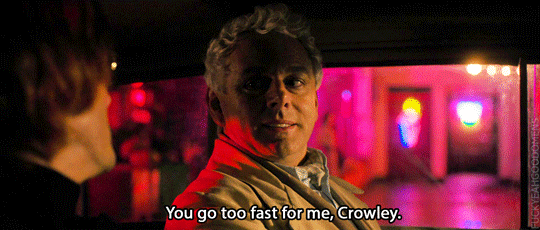
Naturally, this line of all lines, the most line of them all, is constantly circling around my rotten brain like a moth around a flame.
In addition, though, there's always been another Good Omen's line/exchange that has kept bothering me again lately. And literally until just about five minutes ago, I had never thought of relating them back to each other.
Now, five minutes later, I have and I think I just ... figured it out.
In case you were wondering: The second line that wouldn't leave my head is what Aziraphale says to Crowley during their clandestine meeting at St. James' Park in 1862 when Crowley asks him for Holy Water:
A: "I'm not bringing you a suicide pill, Crowley!"
And here's what bugs me about this: Why did Aziraphale, without a breath of hesitation, immediately assume Crowley wanted the Holy Water to commit suicide if things ever went wrong?
That's ... such a dark assumption to make. Especially because that is absolutely not what Crowley wanted it for, as he literally says himself:
C: "That's not what I want it for, just insurance."
And what does Aziraphale reply?
A: "I'm not an idiot, Crowley!"
Because he firmly, firmly believes that Crowley is asking him to bring him the Holy Water as a foolproof method of taking his own life in case Heaven and Hell ever find out about them.
To this day, that conversation gives me chills whenever I think about it. We so rarely get see what genuine emotions and thoughts for and about Crowley Aziraphale keeps neatly tucked away behind that tightly buttoned waistcoat of his. This moment in 1862 is one of the very rare ones where his façade slips a little – and the peak we get isn't a fun one. It's a very dark, scared and vulnerable one.
What am I on about and how does this all relate to the infamous "You go too fast for me, Crowley"-line? Let's look at it under the cut.
(Word count: 2560 | Reading time: ~10 min. | TW: mentions of suicide)
Like I mentioned up above, it always struck me to my core that Aziraphale very clearly immediately assumes Crowley wants the Holy Water for possible suicide. Not only is that a very dark and upsetting thought, it also poses the question: Why? Why is that the first place Aziraphale's mind goes to?
Crowley says at the very beginning of their conversation:
C: "We have a lot in common, you and me."
He's definitely referring to their (very mutual) relationship Arrangement and the fact that they both find themselves kept apart and watched by their respective head offices, not allowing them to ever misstep and give themselves away.
After bickering around a little like they do, Crowley asks his favour – and he makes it very clear in a quiet and serious voice that:
C: "This is something else. [...] For if it all goes wrong."
He's not just talking about Heaven or Hell finding out about some silly frivolous miracles, no. He's talking about them finding out about their Arrangement, their relationship. The worst of all worst case scenarios.
So bad, in fact, that he doesn't even ask his favour out loud but instead decided to write it down.
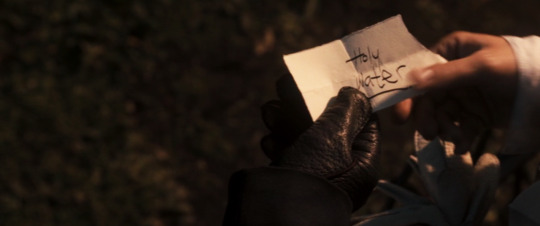
Aziraphale's reaction is ... severe.
We immediately see his face drop as, he too, realizes that this is all of a sudden a very serious conversation indeed. And he immediately and vigorously denies Crowley's request because he thinks it to be one for a suicide pill.
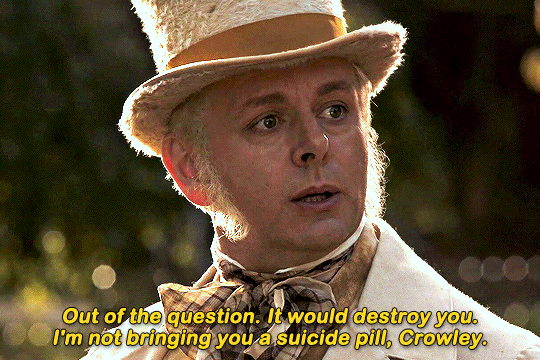
To understand how he could arrive at that lightning-quick (and also wrong) conclusion, we have to try and understand how Aziraphale sees Crowley and the threat that the angel himself as well as their relationship poses to Crowley.
Crowley can, at times, be a very self-deprecating and cynical character. He's without a doubt carrying a lot of trauma and unspoken fears and emotions with him at all times. Aziraphale at this point in their relationship probably has a good notion of what those are – but he doesn't know the whole depth of it because they've never been able to speak freely enough and Crowley has seemingly decided to keep many-a things to himself, still. They both tread the waters of plausible deniability very well.
So, to jump to the conclusion of Crowley entertaining suicidal thoughts in the face of unavoidable danger is ... quite a violent jump. And remember: "[...] underneath it all, Crowley was an optimist. If there was one rock-hard certainty that had sustained him through the bad times then it was utter surety that the universe would look after him."
So, what is it that Aziraphale does know that would drive him to such a drastic conclusion when, in reality, secret optimist Crowley only ever wanted the Holy Water to protect himself against Hell to come out safe on the other end of things?
2500 BC, Land of Uz: A: "That [going along with Heaven/Hell as far as you can] sounds, um ..." C: "Lonely? Yeah." A: "But you said it wasn‘t." C: "I‘m a demon. I lied."
After Crowley helps Aziraphale out in Edinburgh in 1827, Crowley is immediately sucked back down to Hell We don't know what exactly happened after that or just how long Crowley was gone. We also don't know if Crowley ever told Aziraphale what happened, once he returned. What we and Aziraphale do know, is that Crowley ends up asking him for Holy Water, out of the blue, only a couple of decades later.
1601, The Globe: A: "But if Hell finds out [about the Arrangement], they won't just be angry. They'll destroy you." (additionally, later in time, C: "My lot does not send rude notes.")
Ergo: It's very clear that Aziraphale seems to have put two and two together with his own angel math by what he has a) witnessed himself and b) what Crowley has said himself which equals: In going against Hell, Crowley has felt incredibly lonely before he had Aziraphale by his side and if Heaven and Hell were to ever find out about them, Hell's punishment would be a whole lot worse than Heaven's.
He thinks Hell would destroy Crowley.
So when Crowley, who so rarely says how he really feels and one of the few times he did, told Aziraphale he was lonely, says he wants the Holy Water, the immediate conclusion Aziraphale comes to is: He wants it as an emergency exit. In case things go pear-shaped. He wants it to escape whatever dreadful punishment Hell would have in stock for such a lonely traitor. He wants it as a suicide pill.
For Aziraphale to not even entertain the thought or believe that Crowley does indeed only want the Holy Water as a means of self-defense is, again, absolutely heartbreaking. Because it tells us a thing or two just how scared and desperate Aziraphale thinks Crowley to be. Something along the lines of: "If I myself am already so immensely terrified of Hell's punishment for Crowley, how terrified must Crowley be."
I think a whole lot of this is also very, very strong projection and shows us how Aziraphale himself feels about all of it. How scared he is for himself and Crowley. Of what would be done to them.
A: „Out of the question! Do you know what trouble I'd be in if they knew I‘d been ... fraternizing?“
He knows they would both suffer immense consequences and that Crowley‘s still would be worse. If anything, in a dark and twisted way, it shows that Aziraphale himself has definitely entertained the idea of suicide as a concept, at least. Maybe not for himself or Crowley, yet, but remember, he‘s awfully fond of Shakespeare‘s Hamlet.
A: „To be or not to be? Buck up, Hamlet!“
Yeah, buck up indeed. (By the way, there's a great meta by @greenthena on why Aziraphale likes Hamlet so much that kind of plays into my point a little. You can read it here).
And again, who knows what Aziraphale might have actually witnessed of Hell's cruel ways already in the past (Edinburgh of 1827, or at other times) that made him arrive at the conclusion that, ultimately, suicide would be the less painful choice for Crowley when faced with Hell's consequence for their relationship.
I told you this was gonna take a bit of a darker turn. So, here we are. At the turn. It doesn't get much lighter from here on out, I'm afraid.
Because all of this gives "You go too fast for me, Crowley" a whole new devastating meaning.
Personally, I always found it a teensy bit difficult to relate that line back to Aziraphale implying that Crowley was trying to push their relationship a little too fast for him.
Deducing that as the meaning of "You goo to fast for me" after we were shown in the montage of S1E3 that Aziraphale, from circa 1941 on, was undoubtedly fully aware of just how madly in love he was with Crowley, has always felt odd to me. And it continued to feel even odder after we got the whole story of 1941 in S2.
Because if that minisode showed us anything, it's that if you let Aziraphale take over the metaphorical wheel for about five minutes, "too fast" doesn't even match the astronomical speed with which he crashes head first into 15th base. Forget the hand holding and kissing, let's go straight to you shooting me on the first date I planned for us!

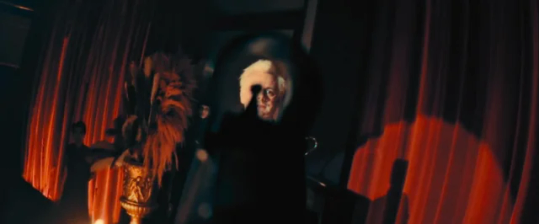
And they say romance is dead.
Now look, of course, Aziraphale is still keeping most of his romantic feelings and longing bottled up out of fear that Heaven and Hell could find out about them and have Crowley destroyed. We've established that this very big fear of his is the driving factor behind him never trying to overstep that invisible line.
But still, those feelings? They're there. Oh, Hell, they are t-h-e-r-e.
Our angel is a master of self-delusion but not even he is holy enough to deny the fact that, if he could, he'd want nothing more than to lock that demon down and elope together into their happily-ever-after.
So, when Aziraphale finally budges and hands over the Holy Water to Crowley in 1967, I've always had a hard time believing that that line coming from Mr. "I guess there's something to be said for shades of grey" himself actually meant: "I'm not ready yet, you want to go faster than I do."
Because really, apart from trying to convince Aziraphale of the Arrangement and rescuing him from every silly, coincidental predicament the angel has gotten himself into over the millennia, what exactly is it that Crowley did here to "go too fast"? Hell, he's been at it at the pace of a snail ever since, very well knowing that Aziraphale would take a lot of gentle nudging and lunch temptations invitations to agree with the Arrangement.
All Crowley does in that moment in the car is offer Aziraphale a lift, anywhere he wants to go. And yes, that is code their little dance, that is how he shows his love for Aziraphale. But Aziraphale has never before deemed that an issue or seen it as a too-fast progression of their relationship. He even suggests another date himself two seconds later, saying:
A: "Perhaps we could go for a picknick one day. Dine at the Ritz."
So, what, one sentence later he suddenly wants to hit the breaks again? After he literally looked like this the last time Crowley drove (literally way too fast) through burning London?
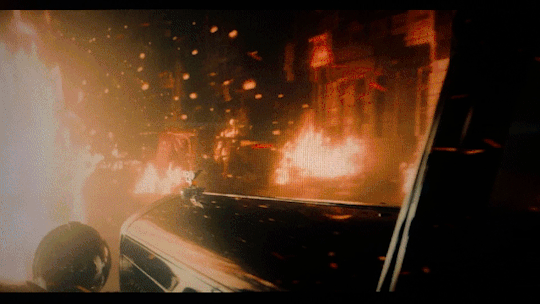
Nah, I'm not buying it.
Instead, here's what I think Aziraphale really means with this line that changed us all (and I'm sorry, but I'm about to one-up the sadness of the 1862 meeting):
I think Aziraphale is referring to what he thinks is the reason Crowley wants the Holy Water for.
Suicide.
And boy-fucking-howdy, does that change the game.
Because if we assume that Aziraphale, all throughout the one-century-long Holy Water standoff, thought Crowley wanted it as a quick, ahem, Escape From Everything, what I think Aziraphale really means with "You go too fast for me" is this:
To him, Crowley is asking the most cruel deed of him to bring him the one thing that could take Crowley away from Aziraphale for good. For ever. In case things go pear shaped. In case Hell finds out about them and comes after Crowley.
To Aziraphale, Crowley is asking him to load the bullet into his gun for the time it won't be a trick. So he can escape before Hell gets to him.
More devestatingly, I think Aziraphale even understands where that notion comes from. Aziraphale knows how dangerous their relationship is. And Hell does not send rude notes. So, I think after pondering on it for a good millennia, part of him has come to understand why Crowley would want an emergency exit.
Which is absolutely fucking heartbreaking.
Especially because that's not even what Crowley was thinking when he made his request. He truly only wanted it as a defense. But Aziraphale doesn't believe or fully realize that. Aziraphale believes the Holy Water is a suicide pill and to some extent even understands why Crowley might want that.
And yet, despite (wrongly, but well) understanding Crowley's intentions, Aziraphale is still deeply upset and terrified at the thought of Crowley taking his own life should they ever get caught. Which explains his extreme reaction all the way back at their clandestine meeting at St. James' Park.
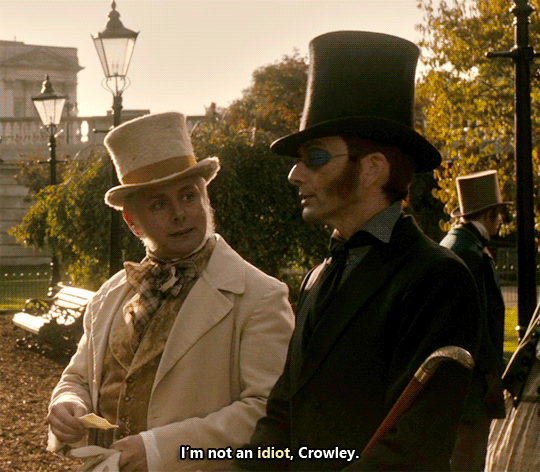
Aziraphale assuming Crowley's way out of the most pear-shaped situation of them all would be suicide also means that Aziraphale would be the one who'd be ... well, left behind.
He recognises that choosing death over possible eternal punishment is maybe somewhat of an understandable choice. And yet, it's a choice that, to him, Crowley has made without him. Seemingly way before their first talk about it.
Aziraphale thinks Crowley seems to have made up his mind about his escape plan without him in it.
He thinks that if they were caught, Crowley would want some Holy Water around to quickly chug before he would be at Hell's mercy and that would be it.
Crowley would, for the first time ever, really leave. Not just for Alpha Centauri. But actually leave. Escape and run away to a point of no return. For good. Without Aziraphale. To a place where Aziraphale couldn't follow him, no matter how fast he tried to run himself.
It goes a little something like:
"If they found out about us, you would choose to go where I couldn't follow. And you're asking me to pave the road for you to walk there. Without me ever being able to get a say in walking alongside you. You want to go to places where I could never join you. You'd run away without me and I understand why but you didn't even give me a chance to catch up. You go too fast for me, Crowley."
F*ck, man. I think I need to lie down.
Y'know what else that gives new meaning to?
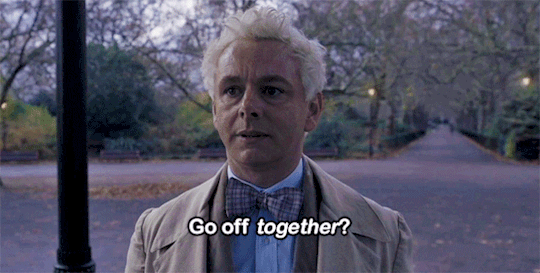
Alright, that's it, I'm out. Enough sad meta-ing for the day. See you all around once I've stopped slipping further into the void, folks. :')
#good omens#good omens meta#my own meta#good omens season 2#good omens 2#gos2#go2#good omens s2#crowley#aziraphale#ineffable husbands#you goo too fast for me crowley#aziraphale is master of projection#i made myself sad with this#The Arrangement#holy water#im gonna go read fluff now bye
483 notes
·
View notes
Text
okay I've been thinking about iterative personhood so here's some of the perspectives we see, in the order of them being most easy to talk about top of head
Mike Walters: obviously we get his perspectives as our point of view so narratively his belief system is offered a lot more weight.
The Mikes tend to agree that they are Not the same person but that they all share this intangible Something that makes them connected. The mother soul you know. They walk that line of shared Identity a lot more than they admit. They may say Staunchly that they're Not the same person (for example Mikey claiming he didn't understand why he panicked when Anne jokingly threatened Micheal during his elder hunter/mustardseed interview) but they assuredly understand that they are made of the same things. Even before we were putting MDawg's mother soul language to it there was hints of that aspect. In Mike and Micheal's first episode we get that line of "you turn into me. remember that" despite Micheal knowing their connectivity is Not assured I could and likely will write an entire essay on Just the Mikes senses of identity (I haven't even touched one MW and Nobody) but Mike is not the only one I need to get to for this post
Ty Betteridge- to more or less touch on the opposite side of the spectrum
Ty is one guy. He sees himself as one guy, and other than outlier Ty's he seems pretty happy with how in sync he is with the others. He is genuinely surprised when one steps out of line strongly even though they all certainly have their quirks. He throws his whole heart into seeing any iteration of a person as being Them. This is likely grounded in trying to cope with what he does at the compound? Both his work with the Mikes and how disposable any individual Ty is. If they are all the same person then he doesn't need to carry any guilt about the deaths and he doesn't need to fear his own death so long as one Ty makes it out
Felix- he states it very succinctly at the end of Felix chronicles
"I am this Felix because of the experiences I have had as This Felix. Another very similar Felix will not and cannot be me. Only I can be me." This philosophy seems More disconnected from other Felixes than even the Mikes. An entirely Experience based view. He does what he does because of what he's been through and so going through anything else, even subtly different makes him a different guy. Those Aren't Him.
Anne: thank god someone around here with a functional fucking council
She has a council and when we see her, she doesn't seem interested in differentiating between herselves. She was Not into having younger Anne called Annie. They are careful about propagation of course and there's a clear command structure within the council, but they make attempts sometimes to be pretty interchangeable in the eyes of base. Taking full advantage of what it means to have a council, and giving certain Anne's orders to die for the cause. She has aims and wants to save lives where she can, but she's Not above sacrificing members of the council for the benefit of the rest.
Sylvester August Baxter: my man committed to one way of viewing his other selves and mostly stuck to it. congrats!
Sly, August, and Baxter were brothers with all the protective "but your still an asshole" energy that comes with it. This may come from him having brothers usually. (I do think his brother he talks about is another iteration of him of course but that's just a theory (A GAME THEO- *gets shot*) and it doesn't change that this is a familial dynamic he's found time to get comfortable in) The Mikes sometimes talk about being brother-like but the actual dynamic as it plays out is a lot more complicated than that and they rarely agree on what to call each other. The Baxter's don't seem to struggle with this when we see them. They genuinely see each other as individual entities and inherently valued as those separate entities. But also know that each other are capable of betrayal because they Aren't the same guy anymore. He is a lot more hesitant to make new iterations. The only time he offers that easily is upon meeting Tex and realizing he's alone.
Edgar: idek hes like- A Complicated guy, and you can't tell what hes thinking 90% of the time
its somewhat difficult to be sure how he feels about his Own personhood. He sees multiple mikes as his Mikey bear. But! he Will kill Mikes if its necessary. then the OV-edgars. They could be dead ofc. Or they could have been mass consolidated. Either way they are not around and we can assume the OV-Edgars (having been made specifically to escape with Mike) would like to be with Mike if they physically could. Them not being allowed to meet MW implies at least a distrust on Edgar's part. Unless ofc he consolidated with them all. and Edgar has demonstrated a willingness to consolidate with other Edgars in the past (rugby, the continuous correction leading to him taking on Edman's memories) so he could have done that maybe so? you can be the same person in his eyes but that doesn't entitle you to the same treatment. He's too practical for that.
Helen Hartley: maybe the most just? grounded in the actual consequences of multiple selves?
she expresses fear that another version of her might try to come take this life from her. she recognizes they would have the same wants but because This Helen is not them. She would not get to keep this life if they took it.
Chris/Chance: i mean they fucking hate each other tbh
so he is doing the council thing fairly effective i think, in that there are still extras of him kicking around who are completely unaware of base operations, thereby having an extra break glass in case of emergency cowboy on hand. but the willingness to use Chance for their purposes with all the ethical implications of memory wiping a guy and giving him a new life (even if he agreed tbh?) implies a disregard for each other. they are the same guy (negative) it seems? like they recognize their flaws in each other and are able to be cruel about it. which doesn't bode well for Chris's self esteem but that's alright
Hunter Jeremiah Hartley: y'all have three of you and you choose to ALL work full time? what the fuck is Wrong with you
fuck man they're a Mess. they're a team, they work together, they look down on the youngest hunter for being naive a bit for sure. and then things get worse so they are at least different enough to really dislike baby hunter
its really really interesting the different ways everyone sees it. some of these perspectives are more radical and difficult to really believe for me but make sense for the character (like ty, idk dude that literally wasn't u tho? Agsjsk) but they all have some fair credence depending on what you believe shapes identity and where you land on the whole ship of theseus thing
anyway yeah, rotating them
28 notes
·
View notes
Text
"that's up to you."
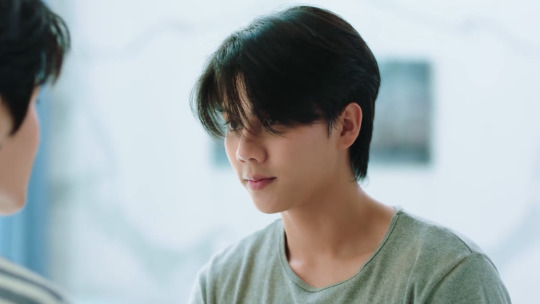
this was a mahasamut episode and something that stuck with me is the fact that he is someone who seeks to be chosen and intentionally loved. as there is intention in everything he does and says. as well as in what he feels. that is his love language.
however, what solidifies it for me is just how tied it is to his wounded inner child. this is a boy who was faced, very early on, with the notion that home is the thing you walk away from and that it was what he had to do to survive.
mahasamut does not think highly of himself. confident as he can be, that is something that is made clear throughout the entire series, whether it's through the villagers who fawn him, the belittling of his education and upbringing or his keenness on being on a leash (and this isn't just a kink). the fact that dogs love you no matter how badly you treat them, they'll even die of a heartbreak when you die. there have been stories of dogs who have died in their person's grave or waited for them in the place they were abandoned, hoping they'd come back. so i have always seen mut's undying commitment to that part as the manifestation of being kicked to the curb and treated like a dog (which is already a phrase that implies a certain dehumanization that i fear he has internalized) by his father. in spite of that, he remained loyal, loving, considering, earnest, honest as both not to let others feel the way he felt but also so he isn't something to be thrown away. though even if you do, he'll be there, in your grave. and i guess that's the point.
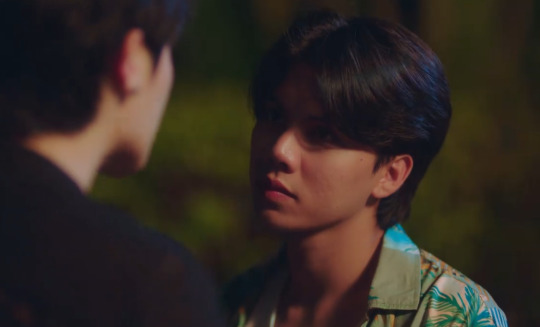
his selflessness, as characteristic of him as it is, wasn't nurtured in a vacuum. it doesn't entirely stem from simple kindness either, but i gather from a need to be purposeful and useful. it comes down to having a sense of belonging as well, which particularly speaks to how he reacts to being included in rak's life and family. in his future. in the midst of uncertainty and the expectancy that at one point, he has to give himself deadlines for self-preservation because he is the sort of person who will lose themselves, trying to save you.
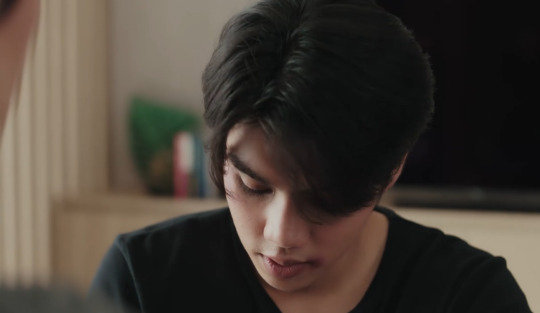
i often use the quote "the violence it took to become this gentle" because it did, in fact, take a lot of it and no one will really ever know just how much. how much he has seen, how much he suffered, how much he has done to himself. being in a small town is no small challenge, and for a long time, i kept thinking about how alone he must have felt. how determined he was in showing tongrak that his father was weak and mediocre. how people used to laugh at him. knowing that his father probably had a lot of friends and was known in the village and in a small town, that often means to overlook and handle certain situations and topics in a very narrow way. i don't think he ever had the chance to show how weak his own father was, so when he speaks for tongrak, for meena, for anyone, he's also talking to and for himself.
i previously commented that i would have liked to see mut's own processing of his feelings more because as resolved as he seems to be, he has a lot of piled up stuff in there and there's a mut who is insecure, who doesn't want to embarrass you, who questions whether what he can give is enough, who's sorry, who's angry, who's hurt, who can be "ugly" in how he feels. beyond the understanding, the patience, the care, the selflessness. regardless of those things even. there is nuance to being thick-skinned.
apologies don't stop you from internalizing any hurt. it's in character to have different sides to your own pain and feelings. just the fact that he proceeded to punch rak's father is an example, because apart from his need to protect other people, he was also hurt and reliving the disappointment of being cut loose. no matter how much you understand something and someone, it won't prevent you from feeling. that only tells me that there's so much more acknowledgement to be done for him as well.
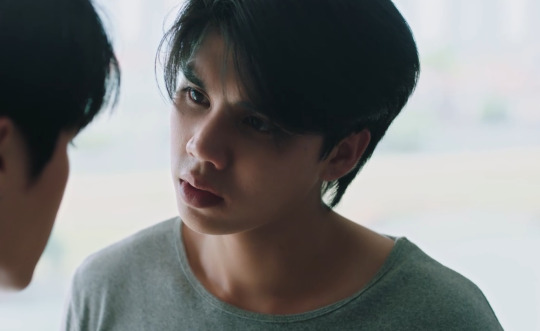
so with the 10th episode, we have someone who is backed up against a wall and has to decide to care about his own well being for once and whether he's okay, tired, has reached a limit because he knows he can be disappointed, and we understand that through his conversation with mook. you can just tell this was a long process of rumination. what makes it even more curious is the fact that, even though he knew he could be rejected and had to accept it, we see his inner child resurfacing when it happens. the resignation, the anger, the apologies as he is the fool and has forced himself on to someone. what makes it harder, in my opinion, is the realization that you can be loved but somehow it's not enough for someone to stay. i feel like that moment when he realizes what the number 8 represented, what he represented caused such a visceral deepening of that wound, and made him once again face the question of why must he always leave his heart behind and why won't anyone hold on to it. he internalized that.
tongrak shifts that when he decides that home is the thing you run to and what really got me is the request that he tells mut how he feels to his face instead of an apology. tell me who is home. i need to hear it. who do you love this much?
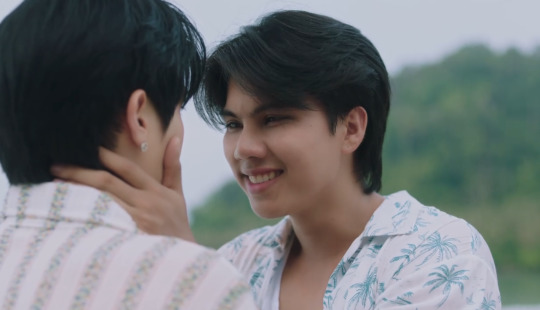
you're here. i'm here. we're here. remind me of this fact for the rest of our lives.
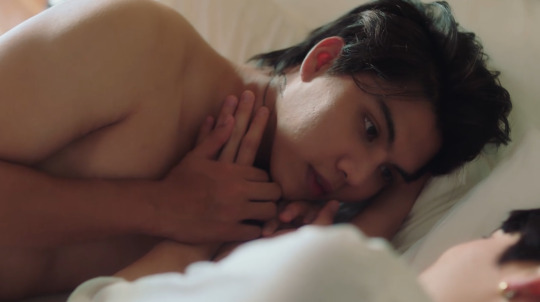
112 notes
·
View notes
Text
Haven't ranted in a while ... sorry about the typos and apologies to anyone actually reading this and falling asleep.
Don Augustin: time for the holy inquisition

Marta: we’re out in the open … do you mean outquisition?

Don Augustin: let’s talk about the flowers and the bees
Marta: it’s winter (and the only bee in sight is my practical, little engine-that-could, beetle)

Don Augustin: sex is solely for procreation and, also, are you pregnant
Marta: I’m PRO creating anything (with Fina and only Fina - in fact, we love pollinating the flowers every chance we get)
Don Augustin: trafficking in bad-faith since 1958
M(harta): put the pedal to the meddle
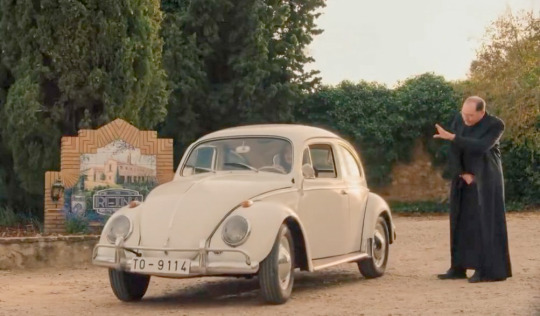
On to The Ladies of Angst: the Fellowship of the Gays.
The enteral conflict between heart and reason. Reason tells Marta and Fina this is a way of securing a future together and safeguarding their love. The heart, however, is desperately clamoring for the opposite, even if it’s dangerous and would leave them exposed. What will it be?
The more the wedding approaches? The more devastating it becomes. Even for safety purposes and convenience only? It still means Fina has to helplessly watch the love of her life marrying someone else. It still means Marta has to wear shackles once more. What is the right decision anyway? It’s all so confusing, conflicting and heartbreaking and they’re doing a great job emphasizing it. This is a problem-solution that leaves no one unscathed.
After all, to have touched heaven only to be cast out, because the cruelty of people knows no bounds? Excruciating. Now that the snowball has turned into an avalanche, Fina and Marta need to trust each other above all else if they’re to survive it. Of course doubt abounds. Of course they’re torn, scared and confused. But their trust and communication has never wavered and it won’t do so now. In fact, they need to be more united than ever. It’s the only way to move forward and secure a future together. They’ll find a way, they always do. They are each other’s person, each other’s one and only. And they’ll face everything head on in order to be together. When it comes to each other, there is no going back.
Interrupting briefly so that someone (and by someone I mean Marta) can give Fina a hug. She desperately needs one.

I will say. I have my doubts when it comes to Fina trusting Digna with anything. The reason? They’ve not addressed the fact that she used information about Marta and Fina to manipulate Tasio. So, to me, it feels rather odd having Fina share anything with Digna at the moment (it's not clear to me what Fina knows about that entire fiasco). At this point in the story though? I suppose Fina's pain is growing too fierce and unmanageable and she needs an outlet. Needs to purge herself of some of it. That being said, their scene was lovely. Fina really needed to vent and was in dire need of both good advice and a motherly hug. Therefore, points to Digna for lending her support, understanding and wisdom, as contrary as she may be. She rose to the occasion and was there for Fina and Marta in a time of need.
However, who Fina really needs to vent with? Marta. Even if she feels Marta’s load might be getting too heavy. If anyone can grasp how she’s truly feeling, shares her fears and pain? That’s Marta herself. And she’d more than understand Fina's fears of inadequacy, of feeling overwhelmed and unsettled, insignificant even. This despair is a shared one and pretending it isn't? It's undoing them from the inside out.
Now that the wedding day is fast approaching, the consequences of this marriage are truly starting to sink in. Their time together will be limited, Marta will have to divide herself between her business commitments and, sadly, Pelayo's social and political engagements. And where does that leave Fina? Alas, as she fears, confined to the shadows, alone, waiting to be seen, endlessly waiting for her turn. Given the road ahead mostly signals conflict and heartbreak? It's paramount they communicate without holding anything back. This particular hurdle can only be overcome if they hold each other as tight as possible. Which means they need to have one of their serious heart to heart conversations, one where no avenue is left unexplored, no rock unturned.
And it’s not only Fina who desperately needs to unburden herself with Marta. Marta herself would greatly benefit from baring her soul to the woman she loves. She has, for the most part, managed the art of approaching her impending nuptials like the business deal it is: a cold and detached transaction with many strings attached. She even manages to look at Pelayo and see a friend, of whom she has precious few. However, Fina cannot and won't be able to tackle it all the same way. Fina's not been raised to wear an iron mask, like Marta has. She wears her heart on her sleeve and her sensitive nature is crumbling under the weight of it all.
Besides, Marta needs to let Fina be more involved with the wedding plans, if possible. Sure, she wants to spare her the pain of it all, but it achieves the opposite because Fina feels abandoned and left out, aimless and forgotten. Not to mention this entire thing is playing right into Fina's insecurities. That ever-increasing perception of being small and inadequate, of falling short in every way? Even if it's the furthest from Marta's intentions, it's constantly being reinforced. Fina doesn't belong to the same social class as Marta, doesn't have the same education, doesn't have a business acumen and her only remaining family is Marta herself, whom she can never claim as her wife. Everywhere Fina turns these days? The discrepancies between her world and Marta's have never been as bleak, the contrast never as stark. It’s debilitating and Marta needs to pick up on the distress signals Fina is sending, before it all reaches a crescendo.
And to rub salt in the wound? Leave it to Gema to exult Pelayo's virtues, bask in the class difference between the two families and Fina, then gloat about Isidro having driven both her and Marta to their respective weddings back in the day. Fina's pain while listening to all of that? Unbearable. It felt like watching the light being drained from her. Like @midniteowlet mentioned during one of our talks about the show, Fina is the kind of person who needs to feel involved, needs to feel like she's a part of something. To have her looking so dejected and despondent, then blaming herself for not being stronger? Holding herself accountable for not giving more when all she ever does is give? Getting knifed probably hurt less.
Not to mention she'll feel so alone and out of place at that wedding, on the outside looking in, surrounded by upper-class snobs, witnessing the love of her life marrying someone else. I suppose she can lean on Digna and Carmen, but this paints an excruciating tableaux.
Fina's light is gradually going out and it's distressing to witness. I suppose it's only a matter of time now before both Marta and Fina fall apart, one way or another. More so, they need to fall apart together so they can help each other back up, so they can heal each other from this wound. No one else should be a part of this process but the two of them. They think they are protecting each other by not giving voice to their fears. Nonetheless, it only serves to twist the knife further. Moreover, they know the moment they show weakness, they will come crashing down: all it takes is one word either of them may utter. They're so desperate to be strong for each other they forget their strength always comes from being vulnerable with one another. The dread and stress they are currently under is overwhelming. Way to drive it home with these angst-filled scenes.
I will say? With the exception of Pelayo being gay himself and his social status? There are a lot of parallels being drawn between the Jaime era and this one. Personally I do not think the writer's intention is to revisit old scenarios but to showcase character growth. Marta and Fina have learned from their situation with Jaime and won't fall prey to old patterns. Most likely, they will come together to plan, reassure and comfort. The current, angst-filled scenario is a tool to generate tension and suspense, to keep viewers guessing, wondering and pondering. Marta & Fina have been through a lot together and, as a consequence, they have grown both as individuals and as a couple. Therefore, I do not think there's any intention of recycling old story-lines, but to mark the difference between then and now. There's a before and there is, and will be, an after. They both know who they are and what they want. Any obstacles along the way, including miscommunications or latent fears? It's fuel for angst and character growth and the show has proven time and again how well it handles it when it comes to Mafin.
Special mention to Marta's frailty in confessing Sometimes I go to sleep dreaming that I wake up the next day in a world where no one cares that there are two people like us. It is exhausting to live in fear. Gut punch, writers, gut-punch. Kudos.
Oh well, I'm sure the show won't get as dark as we always think it will.
Ultimately, it never does.
Other thoughts, in no particular order:
After the marriage, Pelayo will go live with Marta at the de la Reina house? How they’ll manage anything with everyone underfoot? No idea. Given the kind of money these families have, this is rather mind boggling. But hey, the more, the scarier. The budget must be really tight. Nothing like living under the same roof as Jesús and Maria while trying to lead a double life. Marta, Fina and Pelayo need a house of their own. Anything else is pure folly. Marta needs to be in Toledo with Fina and close to the company, so it makes sense they would not change location. However, the de la Reina house shouldn’t be an option. The Mafinca is the solution, even if it means Marta & Fina's space won't truly be their own any longer. At least they’d have some modicum of privacy there. Anything but the casa grande.
Carmen not calling Tasio out on his bs and shady maneuvering? Disappointing. Maybe that this will come full circle later on? Or, novelita style, it won’t happen at all. It would be surprising if they let it slide entirely, because Tasio’s betrayal was no small thing. In fact, it upended the very way the business works and has thrown it all into disarray. And if Carmen keeps silent on this? It will be a hard pill to swallow and very unlike the Carmen we once knew. “Once” being the operative word. Her “what have they done to you now”? I cringed, not going to lie. I miss early-days Carmen. Her continued passiveness when it comes to anything Tasio? A let down. She thinks he's qualified for his current position, sans de facto qualifications, that he ought to know his new family's MO, which he doesn't and worst of all, that he should make good with Don Pedro to consolidate his position. It's not only disappointing but getting tiresome. It's as if Carmen's brain cells cease to function when Tasio is around and it's sad to see. Are we supposed to believe no one told her how Tasio got promoted to this current position, that she’s so utterly clueless? And add in the fact he still gave her shit for wanting to get her driver's license? If he sinks any lower he'll be wearing his shoes for a hat. And she’s not far behind. I mean, they have their moments but goodness ... cuesta arriba.
Be still my heart: the Merino bros defending Marta in front of Jesús? Have they had a shot of wisdom? Has hell frozen over? Will wonders never cease? It won’t last, of course. But hey. De las migajas, que el festín nos queda grande. And look at Don Pedro wanting to remove Joaquin from the directorship already, saying he's making a mess of things. How the turns are tabling.
Fina and Claudia’s friendship? I want more of it. Same for Claudia and Tita Manuela: they're so sweet. To be honest, I’m at the point I don’t miss Carmen at all. Not really. Let’s see where this all goes, shall we?
Damián and Pelayo's snippet from the preview? At this stage in the game? I don't think Damian would do anything to jeopardize his relationship with Marta. And that means he needs to look out for Fina as well, because she is Marta's world. Previews, as we all know, are purposefully misleading. I don't think this one is going to be the exception.
50 notes
·
View notes
Text

Good lord. This is what anti-intellectualism looks like.
For starters, this user was asked SPECIFICALLY to look up the definition of Copaganda BEFORE they responded. And since they make no attempt to reference the definition to explain their reasoning, it’s pretty clear they did not do that. So before we begin, let’s all get on the same page here.
From Wikipedia:
“Copaganda (a portmanteau of cop and propaganda) is propaganda intended to shape public opinion about police or counter criticism of police and anti-police sentiment. It has mostly been used to criticize news media creating one-sided depictions of police, uncritically repeating police narratives, or minimizing police misconduct. The purpose of copaganda is to sway public opinion for the benefit of law enforcement and redirect attention away from news which may generate a negative image of law enforcement.”
So there we go. Copaganda has a VERY specific goal in mind. Shows like Dragnet, NCIS, Law & Order… that’s copaganda. They take the role of cops and rules of law and make them into heroes we root for. These series and stories are creating a narrative where following the law is the way of life and people should be punished for breaking the laws and that it’s good when cops catch the criminals who do so. Reinforcing and glorifying the rule of law to the audience.
Arcane is NOT that.
Arcane frequently showcases the worst of the Enforcers. Marcus AND Caitlyn both fall for corruption schemes. Many of the Enforcers are depicted as hulking brutes and being stupid. We are REPEATEDLY shown the Enforcers beating up on innocent people and hurting the oppressed. And there are definitely negative consequences to these actions too. People fear the Enforcers. People kill them. It’s never framed as justified or right when they hurt innocent people. They are criticized in-universe for their actions. The opening sequence of the story involves Enforcers committing atrocious acts of violence on the bridge between the cities, and this is one of the main conflicts that affects every character’s motivations in the story going forward.
So we are already on shaky ground when they suggest Arcane is copaganda. Their entire premise is faulty. Let’s see how this unravels.
In a recent interview Amanda Overton says that in order for Vi to fall in love with Caitlyn she needed to “get over her belief that there are no good cops.” This user is taking that to mean Amanda Overton is intentionally pushing a copaganda message in Arcane and that this is “proof” that Arcane is a centrist message. You see, this user thinks in terms of black and white. There are good and bad things. Oppressed people are inherently good. All Cops are bad. Zaun is good. Piltover is bad. It’s a really restrictive and limiting perspective to have, especially for a nuanced show like Arcane where EVERYONE does both good and bad things. And this cognitive dissonance is clearly making it hard for them to grasp the message of the show. They see Piltover “win” the war (that they created) and sees this as the show supporting Piltover’s ideology. They see Vi fall in love with Caitlyn and sees this as an abuse victim falling for her oppressor. They’re fundamentally incapable of understanding nuance because everything must be kept strictly black and white good versus evil.
And one of the ways this black and white thinking manifests is in being upset if there aren’t consequences for bad behavior. I find this to be the most ironic aspect of their criticisms that Arcane is copaganda because just like how REAL copaganda punishes people who commit crimes, people with no grasp of nuance get angry that characters who do bad things aren’t punished for doing bad things. This user’s main gripe in their opening paragraph is “we don’t get to see the consequences the strike force team had on the general public.” And their reasoning is that because we don’t see this information that MUST mean that Arcane and the writers are ENDORSING the actions of Caitlyn and her strike force. They NEED the narrative to explain to them that Caitlyn using the grey is bad for ALL of Zaun, not just the chem barons, because of their black and white good vs bad mentality.
And this is clearly evident in the next paragraph where they talk about Caitlyn’s perceived sins. It’s almost hilarious how they basically defeat their own argument immediately isn’t it? Because yeah… if you ARE “trying to make a not all cops are bad narrative” it IS stupid to use Caitlyn as your subject matter when she clearly does bad things! BECAUSE THATS NOT THE GOAL OF ARCANE. It’s NOT a “not all cops” story.
It also frustrating to see one of Caitlyn’s sins being listed as… cheating. WTF? Caitlyn didn’t cheat on Vi. For starters they were never officially dating in the first place. There was clearly interest and sexual tension between the two, yes, and they kissed… ONCE. Then shit went down, Caitlyn and Vi broke up, and THEN Caitlyn slept with Maddie. I’m sorry but that’s not what cheating is. You can’t cheat on someone if you’re not together. It’s only cheating if you ONLY view their relationship through the lens of shipping. Again, black and white thinking.
Caitlyn also didn’t arrest Isha. WTF? Ambessa’s henchmen did that… behind Caitlyn’s back no less. Caitlyn didn’t even know Isha was involved in the attack at Stillwater in any way. This is the other thing these anti-intellectual people do. They try to simplify the narrative by ascribing negative things in the narrative to individual characters. For example it doesn’t matter that Ambessa’s men were doing things behind Caitlyn’s back because Caitlyn is the one in charge of the enforcers so therefore it’s her fault that happened. Caitlyn gets the blame for the actions of other characters who are acting independently and against her wishes. And we KNOW it’s against her wishes because she literally tells us this in the show! Caitlyn calls out the actions of Ambessa’s henchmen instigating violence in episode 4.
The ending message of the show is not that “the oppressed must forgive their oppressors.” Again, this black and white thinking prevents them from grasping “the enemy of my enemy is my friend.” Zaun teaming up with Piltover to defeat Viktor and Ambessa is not Zaun somehow magically forgiving Piltover for all their crimes against them. That is Zaun realizing that if Piltover falls then their homes in Zaun will be destroyed too and it’s better in the interests of everyone to fight with Piltover to defeat a common enemy. “The needs of the many outweigh the needs of the one.”
The criticism against the scene with hallucination Silco is also hilarious because… that’s NOT Silco. That’s Jinx. That’s HER hallucination. That’s Jinx having a conversation with herself. So obviously Silco isn’t going to be behaving like the real Silco. Arcane as a show messes with the meta on many occasions, but it’s NEVER had internal monologues before. So it would’ve been really weird to suddenly have Jinx’s internal monologue voicing her opinions in the second to last episode of the series. Narratively speaking this is just a visual way for us to see what’s going through her mind.
Hallucination Silco also doesn’t say anything about forgiveness either. He says that he thought killing his perceived jailers would set him free. But as we know from watching the show, that doesn’t happen. Violence against Piltover just yielded stronger and worse violence. This isn’t to suggest the only way out of oppression is to not fight back, but that both cities are in a cycle of inflicting violence upon each other over Jinx’s actions. Jinx didn’t start the tensions between the two cities. Those tensions existed long before Jinx and Vi were born and will exist long after they die. However Jinx is the cause of the CURRENT heightened tensions between the two cities. If Jinx is put on trial, Zaun will retaliate against Piltover. If Jinx is freed, Piltover will retaliate against Zaun. No matter what happens to her, the cycle of violence will continue.
Do you see how understanding context matters in understanding the narrative? You can’t take that whole internal monologues with Jinx coming to the conclusion that leaving is the best chance Zaun and Piltover have to beginning to heal and reduce that down to “oppressed should forgive their oppressors.” Cuz that’s NOT what’s being said by ANYONE.
Once again this black and white thinking prevents them from seeing the tragedy of the show. They’re under the impression that if you have an oppressor and oppressed, the ONLY way that story must end is if the oppressed overthrow their oppressors. Nothing else will suffice. Now they are right to be mad that Piltover doesn’t do more for Zaun after what Zaun did to aid them in the war. This is not a happy ending. The theme of the show is the cycle of violence. By having the show end with little done to mitigate future violence, the show is TELLING you that this cycle of violence WILL continue. This is the show sending the message (a rather condemning message at that) that the cycle of violence has not been broken for everyone. Piltover will likely continue to oppress Zaun. But what’s important to grasp is that the show also doesn’t frame this as a good thing. It’s frankly quite clear by Caitlyn’s speech that she understands the gesture Piltover extends towards Zaun isn’t enough. Not by a long shot. How ANYONE sees that and thinks the show is trying to say you have to forgive your oppressors or believes this to be a “centrist” message is beyond me.
The problem with critiquing the AU is because the AU is meant to be a heightened example of what could happen if everyone actually made an effort to change. It is intentionally idealistic to provide a comparison to the “real” world Ekko came from. It also ignores the YEARS of in-universe changes that happened as a result of Heimerdinger’s influence. What do you think the oppression between Zaun and Piltover would be if someone as influential as Heimerdinger actually gave a shit about Zaun and consciously made an effort to make amends for their wrongdoing? It’s hilarious to me that this user WANTS what the AU had, but still manages to CRITICIZES the AU for even existing.
Once again, the black and white thinking rears its ugly head and we get ANOTHER misunderstanding of the events of the show. It is true that Caitlyn does sign Vi up to be an enforcer behind her back… but what’s crucial to understand the sequence of events leading to Vi joining is that Vi initially REFUSES to join up. She REJECTS Caitlyn’s offer to join the enforcers and WALKS AWAY. And she does so because Zaun is about to be invaded with Enforcers. The council has already voted and the plan is in motion. If Vi joined then she would essentially be becoming the enforcers on the bridge killing people like when she was a child. That’s WHY she goes off drinking too. It’s hopeless. That violence is coming and there’s nothing Vi can do to stop it.
But then the memorial attack happens. And once all is said and done Vi has an opportunity to talk to Caitlyn again and try to convince Caitlyn to call off the full scale invasion. And what’s so-often glossed over here is that Caitlyn AGREES with vi. She apologizes for springing the badge on her, then opens up about how hopeless the whole situation is. And then. I and Caitlyn work together to come up with a plan that will MITIGATE the violence against the innocent people of Zaun. That is decidedly NOT coercion. That is a joint effort between both parties trying to find a common ground to resolve the conflict. And THAT is why Vi joins up. Because if she doesn’t TRY to stop the violence now, it’s going to be the bridge disaster all over again. And if that means putting on a uniform then so be it. Vi’s ego is less important to her than the safety of the innocent people of Zaun. “The needs of the many (Zaun) outweigh the needs of the one (Vi).”
There’s so much more wrong with the way this user frames things, from the idea that the sex scene is Vi “degrading herself to please Caitlyn,” to not understanding the “dirt under your nails” line is a callback to her saying they were oil and water and that she’s not literally calling herself dirt but that she’ll keep Caitlyn grounded… it’s almost impressive how INTENTIONALLY negative they choose to read every interaction and scene in this show. If I didn’t know any better I’d say they have an agenda to present Arcane in the worst possible light, and the only way to do that is to misinterpret and misrepresent EVERY MOMENT in the show. For someone who hates propaganda they are doing a MARVELOUS job of creating their own anti-Arcane propaganda.
This black and white no-nuance anti-intellectualism is detrimental to critical thinking. This is why I hate the Arcane Critical hashtag so much. Because it’s not being critical at all. It’s misrepresenting the events of the show with a clear purpose of pushing a black and white thinking agenda. People in the arcane critical hashtag don’t want you to think critically about the show. They want you to think dumbly. They want you to reduce the conflict down to black and white good versus evil terms. They don’t want you to understand the complexities of nuanced characters. They don’t like nuance to begin with because nuance menace putting yourself in the uncomfortable position of trying to understand people who you disagree with. To bring it back to the copaganda idea, the reason they can’t abide the concept that “not all cops are bad” is because admitting that means reflecting on their own biases and prejudices and having to grasp the more nuanced perspective that some people genuinely do believe in law and order and join to become cops because they genuinely want to make the world a better place.
In the most ironic way, they are doing EXACTLY what copaganda does. They are trying to create a narrative that supports their ideology and presents themselves as heroes by demonizing “the others.” Which is stupid because, again… ARCANE IS NOT COPAGANDA.
#arcane#arcane season 2#caitlyn kiramman#arcane critical is a bad faith hashtag#bad arcane criticism#vi arcane#bad faith criticism#i’m so sick of these ridiculously bad takes#copaganda#no nuance#nuance is important#storytelling 101#arcane spoilers#caitvi#amanda overton#arcane writing#arcane thoughts#league of legends arcane#lol arcane
29 notes
·
View notes
Note
I'm so exicited for everything you're doing, I love your blog! Any tips for my sun squaring his saturn?
Thank you love, that means a lot! 💞
How to deal with Sun-Saturn square in synastry?
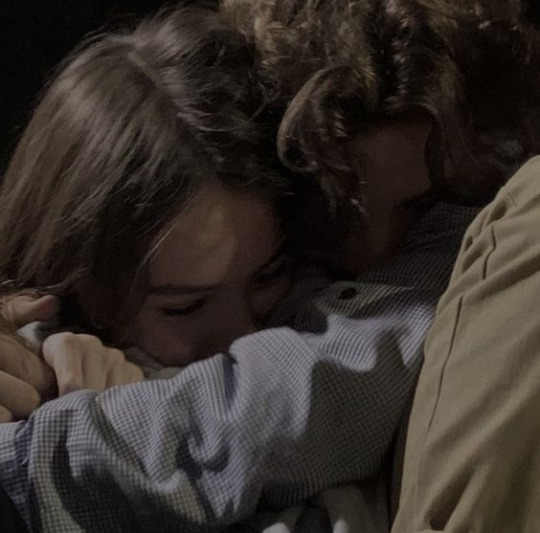

This square is usually attributed to the feeling of not being able to express oneself with complete freedom in the relationship, feeling scared to open up either due to the fear of being judged or criticized [either due to internal or external situations in the relationship]. May feel this need not to disappoint the other and to constantly set high standards either to themselves or both.
As for practical approaches, I can mention the following:
🤍More acceptance and less criticism: This point applies both to how you treat the other and yourselves. It is important to keep in mind that you need to be yourself to be in a relationship, especially one in the long run. A relationship in which you constantly feel like you have to hide or limit yourself can become tiring for you, so if you have the fear of being judged or criticised, you need to communicate this with your partner. If this fear or insecurity comes from past experiences, share them.
🤍Show your support and encourage each other: Opening up to other people can be a difficult task for many, especially if they have had bad experiences in the past. As a couple, show the commitment and willingness you feel to be understanding and accepting with each other. Be patient, reassure the other that they can express themselves without fear of being judged, and make it clear that you can be vulnerable with the other. Verbal, physical reassurance or even through small actions such as putting aside the phone to pay attention when the other person is talking, asking questions to better understand can help improve trust. Don't rush each other and let things flow naturally.
🤍Do activities that the other likes: When you do this, you can see the other person in their element and appreciate how they act. In addition, you spend quality time together, which makes you get closer to the other emotionally. We express different sides of ourselves when we do something we are passionate about and we tend to be more uninhibited, so it can help a lot in dealing with this square. By showing interest in and in each other's interests, you can create feelings of gratefulness, appreciation, and affection.
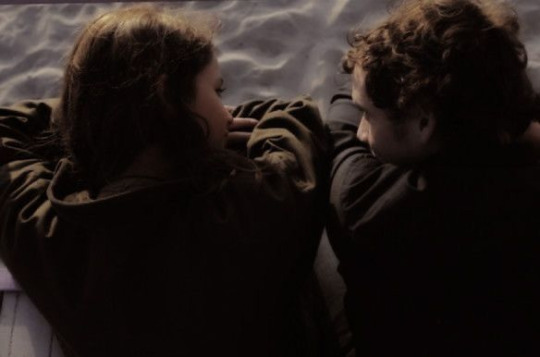

Some aspects in astrology that can help with this are the following:
🩶Sun, Moon, Rising, Venus or a stellium falling in the other’s 5th house: When there is any of these, both can feel very drawn to the other, their individuality and simply the person they are. They can feel happy, delighted and intrigued by each other despite these differences that may exist. They may want to encourage the other person to be more genuine and confident, showing them that they don't have to be ashamed of the sides of their personality that cause them insecurity.
🩶Sun, Moon, Rising, Venus or a stellium falling in the other's 11th house: Similar to the previous point, they captivate each other, only being in this house both can be very different from the other. It will be precisely these differences that make them feel very attracted to the other person. They both encourage each other to be authentic and they freely teach each other what it is to be loved without conditions or expectations.
🩶Jupiter aspecting the Moon makes you both want to learn from each other on a deep level, ensuring you build a supportive and safe environment. Acceptance, affection, support and a lot of affection, they do not hesitate to reassure each other and they care a lot about intimacy as a couple to continue growing and having a positive and pleasant relationship for both. They are patient and understanding with each other which makes them feel that it is safe to open up.
🩶Neptune-Jupiter harmonious aspects make both natives awaken empathy, warmth and compassion in the other, making them feel that it is easier to be honest and emotional with the other. These aspects give a deep sense of strong and caring spiritual connection, which gives them comfort and even a sense of joy. There is that desire to know each other more on a deep level, from what makes them who they are to all the experiences that have impacted their lives, whether positive or negative. They will not make judgments or point fingers at the other, but rather they will prefer to put themselves in perspective to be able to understand better. Support, ability to connect positively with others and good wishes towards the other.
🩶When Venus is making aspects with Saturn, mutual attraction and the desire to care for each other are strengthened, making it easier to handle any type of challenges. Love and affection are present, and that makes both parties to solve problems with greater empathy and warmth. They both want to build a strong relationship which leads them to do everything necessary to make that possible, they strive to make the other feel loved and valued.
🩶North Node falling in the other's 1st, 5th or 11th house makes them a great support throughout the relationship for the other, especially in accepting themselves and motivating them to be more authentic and genuine. They can encourage others by appreciating them and helping them see the good sides of their personality. They teach the other to be themselves without fearing other people's opinions or criticism.
🩶Moon aspecting Sun or Rising makes you feel the trust of opening up to each other. They feel it is safe to talk about their emotions, express themselves and be vulnerable. These aspects speak to us of support, sympathy and a genuine desire to care for others, making them feel loved and taken into account, seen and heard. They are naturally delicate with each other and have the patience not to rush the other to open up. Receptive, supportive and very attentive.
🩶The harmonic aspects of either the Sun-Pluto or Moon-Pluto can be of great help in dealing with this square, because both can help each other break negative behaviour patterns and help the other when going through changes or while working. in themselves. They both give each other the strength and security to work on everything they need, help each other and guide each other towards a path of transformation and healing.
🩶Mercury aspecting Moon, Saturn or Pluto can help you have important, heavy or deep conversations more fluidly and easily. They awaken each other's trust and know that they can rely on the other, tell them about their most personal experiences, insecurities, issues or simply talk about their emotions. Sharing important things, looking for solutions and offering solutions is something that comes naturally to this couple.
🩶A trine, sextile or quintile/biquintile between Neptune-Venus not only make this relationship overflowing with love and romance, but there is also a supportive and adaptable quality to both. The other's flaws are not seen as something unattractive, nor do they place unattainable and demanding expectations on the other, rather they are able to love each other completely and show appreciation for each side of their partner.
120 notes
·
View notes
Text
Dean Obeidallah at The Dean's Report:
The despicable effort by corporate oligarchs—many of who helped elect Donald Trump—to convince the rest of us to submit to Donald Trump is now in full gear. On Saturday, we saw the jaw-dropping announcement by ABC News—owned by Disney-- that the corporation had agreed to pay Trump $15 million in a bogus defamation lawsuit Trump would have NEVER won. ABC also agreed to publicly apologize and pay Trump’s lawyers $1 million in legal fees. The lawsuit arises from ABC News anchor George Stephanopoulos’s exchange with GOP Rep. Nancy Mace in March when Stephanopoulos pressed Mace on how--as a survivor of sexual assault--she could support Trump given his history of sexual assault. One specific exchange cited by Trump’s lawyers was when Stephanopoulos challenged Mace to explain how she could endorse Trump after “judges and two separate juries have found him liable for rape and for defaming the victim of that rape” in the E. Jean Carrol civil case.
Trump’s defamation lawsuit alleged that Stephanopoulos knew Trump was never find liable of “rape”—only sexual assault—and, thus, had defamed him. But two things here. First, federal judge Lewis Kaplan--who presided over E. Jean Carroll defamation/sexual assault case—in his written opinion stated the jury had in fact determined Trump had “raped” Carroll. Judge Kaplan addressed this when considering Trump’s claim the damage award against him was too high because the jury didn’t find Trump had committed “rape” as narrowly defined by NY penal law. But the judge wrote that based on the evidence, Trump had raped Carroll in the way “many people commonly understand the word ‘rape.’” The Judge added, “Indeed, as the evidence at trial recounted below makes clear, the jury found that Mr. Trump in fact did exactly that.” I make that point as a lawyer who handled defamation cases to note that truth is a valid defense in every defamation case. Judge Kaplan’s opinion is the key to ABC News winning this case.
In addition, ABC News has another very strong defense. In a defamation case involving a public figure like Trump, the plaintiff has an added burden of showing not only that a statement is false but that the comment was made with “actual malice.” That means even if Stephanopoulos was wrong in saying Trump was found liable of “rape,” Trump would need to show Stephanopoulos knew that statement was false when he said that or “consciously chose to recklessly disregard the high probability that” the comment was false. But Stephanopoulos clearly could rely in good faith on Judge Kaplan’s written opinion that the jury had in fact found Trump raped Carroll when making his statement.
This is why Trump would’ve lost this case--as legal experts that focus on defamation told the NY Times. For example, RonNell Andersen Jones, a professor of law at the University of Utah, explained: “Major news organizations have often been very leery of settlements in defamation suits brought by public officials and public figures, both because they fear the dangerous pattern of doing so and because they have the full weight of the First Amendment on their side.” All of that is important to understand that ABC News also knew it would have ultimately prevail in the case--but they settled out of fear. They were bending a knee to Trump because during the campaign, Trump had threatened to take ABC’s broadcast license away after the presidential debate because the moderators fact checked his lies. Trump pointedly declared on Fox News: "They ought to take away their license for the way they did that."
With Trump now a month from being sworn in and his pick to head the Federal Communications Commission being Brendan Carr, an author of the far-right Project 2025, ABC News and other media outlets are fearful of how the Trump regime will target them. As MSNBC’s Ja'han Jones wrote, Carr is the type of “media attack dog” that will enable the GOP to follow the playbook of their beloved Hungarian strongman Viktor Orbán and use the agency to silence critics of Trump. ABC News should have never bent a knee to Trump with this unheard of surrender this early in a case they would’ve won. But they were not alone in capitulating to Trump this week.
[...] However, there is also a fear factor at play here as well.
ABC News made a very stupid decision to bend the knee to autocrat-elect Donald Trump by settling, and that’s because ABC would likely have won their case. They are doing this out of fear of Trump handing out reprisals to outlets even slightly critical of him.
Brian Tyler Cohen: Mainstream Media Opts to Obey
#Trump v. ABC#Donald Trump#George Stephanopoulos#Mainstream Media#Do Not Obey In Advance#E. Jean Carroll#Nancy Mace#Brendan Carr#FCC#Project 2025#Trump Administration II#Carroll v. Trump
45 notes
·
View notes
Text
Why Don't We Have An HR Department?
Synopsis: The Assistant Coach of each team is quite literally confronting their adopted dads and/or teams about all the times they’ve nearly attempted to murder other players or nearly died due to unethical coaching practices.
Author’s Note: NO BECAUSE I GET IT’S A CARTOON BUT WHY ARE MURDER ATTEMPTS JUST SOMETHING THAT HAPPENS? WHY DO NONE OF THESE TEAMS HAVE A HUMAN RESOURCES DEPARTMENT? THEY CLEARLY NEED ONE. But also, be prepared for the whiplash difference between Supa Strikas and Invincible United, I'm afraid I cooked a bit too hard with the Invincible United (my favoritism is showing), but IMO, Vince would be so offended that you'd ask him not to commit attempted murder. Also, I didn't add Dingaan because the writer's block was settling in.
Teams: Supa Strikas (here), Invincible United (here), Technicali (Upcoming), Iron Tank (Upcoming), Hydra FC (Upcoming), Nakama FC (Upcoming)
Assistant Coach Masterlist
“THIS IS RIDICULOUS!” Your voice reverberates around the room.
Depending on which team, either the players or your coach/adopted father (or BOTH) shrink in fear as your tone is raised to levels they had never heard before. The work that you had done at the Assistant Coaches’ Retreat, a retreat that you and the other assistant coaches from the other team had planned at a nice secluded island spa to get away and de-stress from their teams, had all been undone in a matter of minutes upon your return. When you arrived, you demanded an explanation as to why the press were all clamoring in front of the building…what no one expected was for intense meltdown you were having, but you were sick of it. You were sick of your players putting other people’s lives on the line, you were sick of your players putting their own lives on the line, and you were sick of your father for encouraging it or even helping it. All to kick points into a goal at the end of the day. You’ve heard of playing stupid games and winning stupid prizes, but where can the line be drawn between stupidity and danger?
“(Y/n), you will NOT speak to your father that way!” Your adopted father retorts.
“I WILL TALK TO YOU THIS WAY BECAUSE THIS IS ABSURD AND YOU CLEARLY WON’T STOP UNTIL SOMEONE CALLS YOU OUT! HONESTLY, HOW CAN YOU CALL THEM YOUR “TEAM” AND PUSH THEM TO DO STUFF LIKE THIS!?
SUPA STRIKAS
Everyone is taken aback by your outburst, especially Coach himself. After all, you’ve looked up to your dad ever since he adopted you all those years ago, but every dangerous “character-building” training attempt seems to have shattered the rose-colored glasses you saw him through. Once you compose yourself, you sound even-toned and professional. Matching the eerie calm stoicism of your father, you narrow your eyes at him and speak again, “This isn’t normal. You shouldn’t be putting me or your players through this. I’ll give it to you, the other coaches are insane, but that doesn’t give you a pass to push them as hard as you do. I mean, what were you thinking? El Matador can’t even survive one day without his hair care product and blow dryer !... No offense.”
“None taken, mi amour.” The pony-tailed forward assures, sashaying his fabulous hair to demonstrate. You turn back to your father, “I understand not wanting to baby them and that ‘tough love’ has always been your thing, but you seem to focus on the ‘tough’ part rather than the ‘love’.”
When you finish, Coach continues to stare at you. Shock was evident from behind his shades, but he then cleared his throat and adjusted his tie, “Well, this is the first I’m hearing such accusations. What do you think, boys? Do you agree with (Y/n)?”
They all exchange uncertain looks with one another before staring at the two of you. While Coach is doing his best to compose himself, it’s clear that he’s radiating with anger at your accusation, but you don’t bother trying to hold back how upset you are. Upset at your father for his unethical practices, but more importantly, you were upset on their behalf.
“In what world would they speak up against you, Dad? If you don’t have the common sense to see what you’re doing is wrong, then maybe you shouldn’t be coaching anymore.” You scoff, your voice breaking as you hold back frustrated tears and push past your father. Leaving them all in stunned silence.
Shakes:
Shakes would be the first one to agree with you, just given his dad’s past with soccer. Your words really resonated with him because his mom barely let him play soccer because of how dangerous it could be, but he’s been treating it like a game until now.
“(Y/n) has a point, guys. I mean, maybe we just haven’t noticed because we’ve gotten so used to it…but it doesn’t mean it’s okay.”
Out of everyone on the team, Shakes has it REALLY bad for you, and seeing you upset like this makes him feel bad. It also makes him feel ashamed that he never said anything before. He’ll chase after you to make sure that you’re okay and to thank you for sticking up for all of them. When you hug him and tell him that you just want to keep him and the others safe, he hugs you back as well. The admiration that he has for you grows even bigger since then.
El Matador:
Shortly follows after Shakes with his usual dramatics, but he does genuinely agree with your argument. He also feels a bit guilty and complicit since he’s very unserious about such things and always laughed it off.
“I also agree with (Y/n), do you know how many times my beautiful face could’ve been injured!? PERMANENTLY?!...But also, I don’t want anyone to get hurt, and (Y/n) shouldn’t have to bear the emotional labor of looking out for our well-being-”
If you’re bummed out for a bit and he happens to run into you, he will applaud you to standing up to Coach and that he may be the “brave El Matador” but you’re truly the bravest one on the team. Might even offer to go on a spa day with you to try and destress from the argument with your father.
Dancing Rasta:
He would feel so responsible because, as the Captain, he feels as though he should’ve called Coach out for this behavior a long time ago. He will agree that you were right to call your dad out, but apologizes because he knows how hard it must’ve been for you to do that, given how much you admire your father and that he should’ve sided with you right away.
“I hope you know, (Y/n), you’re not just our assistant coach. You’re our moral compass.”
As a father himself, he would also try to be the middleman in getting you and Coach to talk to one another again. He hates seeing how miserable you two are without each other, but understands that it might be hard for you two to face each other again after that.
North Shaw:
I’m not gonna lie, North Shaw would be kind of tied since he LOVES himself some extreme sports, but he also definitely sees your point too. While he doesn’t outright say his exact thoughts, but he does cross his arms and nod in agreement with you because you brought up some pretty solid points.
“I mean, like, (Y/n) has a point about things being a bit too extreme. And that’s saying a lot coming from me, Coach.”
Would definitely defend you if Coach struggled to understand your point, but would focus on helping you get your mind off the argument through something relaxing but still athletic enough to take your mind off of it. But also, he definitely thinks you’re the coolest person alive now.
Blok:
Tbh, he also crosses his arms and silently nods in agreement with every word that you say because you are speaking facts. While he’s a big and resilient guy, there have been some situations where he and his poor bears have suffered at the intense training Coach pushes on them.
*Brislovian grunts of agreement*
Would help North Shaw think of ways to comfort you but I think during the aftermath, he’d hand you one of his bears to hug and cry into. If you do take the bear and shed a few tears, Blok will be your shoulder to cry on as he pats your back and comfortingly grunts to let you know how thankful he is for you and to praise you for standing up to your father.
Twisting Tiger:
Bless his heart, Twisting Tiger always wants to try and ease the tension. So he might make a joke about how there’s no gain if there’s no pain but a silent glare from you and your father quickly make him realize that this is no time for joking.
“I suppose we have been treating our safety very lightly…and that’s not fair to you. Coach, (Y/n) is right, I wouldn’t be able to forgive myself if something happened to us…or them.”
He gets nervous that you might want to quit Supa Strikas after this, but he also worries about the emotional turmoil you’ve put yourself through for their sakes. He’d eventually find you on his own and give you a proper apology. When you hug him and tell him that it isn’t his fault, then he feels his fear of losing you lessens a bit more.
Cool Joe:
He’s, per usual, very cool and calm about the situation. Much like everyone else, he’s realizing just how serious the training has gotten and that you DO have a really good point. Also, he knows this is so unrelated, but it makes him a little giddy to see you so protective of them as well.
“I’ve always kept my cool, but (Y/n) has a point, sometimes goin’ with the flow isn’t always the groovy option, and someone’s gotta speak up.”
It gets harder for him to hide his affection for you, just seeing you so passionate about them has him feeling some kind of way, but now obviously isn’t the time. He has tons of good heartbreak records, so if you need to listen to your feelings, he’s got you.
Klaus:
This poor, sweet man would try to say something to back you up, but then he would get HORRIBLY off track. Either way, his point still stands that you’re right in being upset and that he does agree with you.
“I have always felt safe with, (Y/n), but seeing them be mad like this makes me realize we haven’t been fair to her by making her worry about us all the time.”
Shocks everyone with how profound he is in that moment, but they can’t deny that he is absolutely speaking facts.
Coach:
In the aftermath, Coach is actually pretty shaken up because, despite his chaotic and zany methods of training, he is very protective of those that he loves. This would especially hurt coming from you that at first, he wouldn’t know how to respond and might not be proud of his initial reaction…but he slowly comes to see that you’re right.
“You know, I made you my assistant coach for a reason. And you proved me right when you had the guts to call foul on your old man.”
He’ll take into account of having safer but still effective methods of training. While he will consult this new training regimen with you, he understands that you’ve been bearing the emotional labour for way too long and that it’s his responsibility to see these changes through.
INVINCIBLE UNITED
Vince would immediately mock your concerns and not take them seriously in the slightest. He wants to belittle you, try to make you shrink, and everyone else on Invincible United just watches. Too under his thumb to step in, even though you could sense that they wanted to, but that’s fine. You’ve observed how Vince operates from a young age, you knew every single dirty cheat or sabotage he would pull out from his bag of tricks, and you learned to keep some of your own.
“It’s just strategy, (Y/n). You should know that out of all people.” Vince smirks, standing up from his spot as a way to intimidate you. You, however, don’t even react in the slightest as you glare into his dark eyes, “There’s a difference between strategy and attempted murder, Vince. We’re running a soccer team, NOT A CRIMINAL EMPIRE IN CLEATS!”
He eyes you up and down, searching for a weakness. You straighten your back and lift your chin, inviting him to look all he wants, but you’ve been preparing for this moment for a while now. No one has ever yelled at Vince like this before, and he doesn’t like it. Especially when it was you who was doing the yelling, the adopted child he raised to win by any means necessary.
“Do you know how UNGRATEFUL YOU SOUND, YOU BRAT? I taught you that you have to do WHATEVER it takes to win. But if you’ve gone soft on me, maybe you’re not cut out to be on this team.” Vince threatened. Skarra and the rest of the team all tensed, the thought of you being fired…or worse, now causing them to look at you and hope that you regain enough of your sanity to apologize while you still could. You do the opposite, “It’s not that I’ve gotten soft, Vince. You’ve just gotten sloppy.”
As you say that, you hold up your phone to reveal damning evidence of every single underhanded and dirty attempted at sabotage that Vince had ever been behind. Each one holds undeniable evidence of his connection and involvement. When the realization and horror dawns on Vince’s face, your own smirk that mirrors his grows on your lips as you pull your phone away, “If you kick me off the team, I'll send this to the Super League. And if anything happens to me or my phone, I have plenty of hidden backups.”
The shift of power is prevalent in the room as Vince stares from you to the rest of the team. Embarrassment, rage, and anger…and maybe even a bit of pride are all emotions that he’s feeling.
“You think I’m not cut out to be on the team, Vince? That’s funny, because I think that you’re not cut out to lead it.” You grin, walking away and leaving the room of men to stand in shock and with the weight of your words.
Skarra:
Skarra is in a very awkward place in this conflict, as he’s always been Vince’s right-hand man. Even when he gave his spot as Captain to Dooma, Skarra still remained pretty loyal to Vince. However, he feels as though both you and he have formed a deep bond after putting up with your father’s antics for so long, and he knows that somewhere along the line that he fell for you.
Like Vince, he would immediately downplay your concerns and try to dismiss them, all while keeping up his cocky persona. Telling you that it’s just mind games and that all the teams do it to some degree, but he becomes nervous when faced with your steely glare.
“Cute speech, (Y/n). Really dramatic. You should’ve coached for theater instead of football.”
“Skarra, I believe that you have the potential to be the best player in the league. But if you need to rely on trapdoors, magicians, and damn near attempted murder then I guess I was wrong.”
“...”
He hates the way you can make him feel so guilty because when he looks back on it, you’ve never taken anything away from him (unlike Vince). Instead, you’ve always reminded him that he could be more than what Vince offered him. Torn between loyalty to Vince and his affection from you, Skarra will be in turmoil after the whole thing and try to talk you back into apologizing to Vince and trying to make up as soon as possible.
His biggest concern is that by standing up to Vince this way, you’re going to get hurt, and he’ll tell you that. In his own way, obviously.
“Don’t get in his way, (Y/n). It’s not going to end well for you.”
“Are you warning me or threatening me, Skarra?”
“...I don’t even know anymore.” Just be careful, (Y/n).
Dooma:
His initial reaction is that he becomes incredibly miffed, thinking that you’ve now magically grown a conscience, and think that you’re too good for them now. However, when he finally confronts you for it, he realizes that it’s more than just you randomly getting on a high horse.
“Haven’t you ever thought we could be? Without Vince holding us back with his scams and lies all the time?”
“And what exactly could we be, (Y/n)?”
“An actual team. No puppets. And no pupeteers.”
-Dooma doesn’t respect people easily, but he respects you. If Skarra is Vince’s right-hand, then you can consider Dooma to be yours. It doesn’t really matter if you ask him to or not, because he’s assigning that position to himself (much to Skarra’s jealousy). He respects strength, and you’ve got the kind of strength you don’t train for. While he was a bit flirtatious with you before the confrontation, he would be more of a silent protector afterwards. While he understands your initial distrust of him, that wouldn’t stop him from being there to support you.
- When Vince tries to tear you down or embarrass you in meetings to put you in your place, Dooma will be there to agree with you and defend you. Hell, even during matches, he’ll outright walk past Vince and ignore his advice. Heading straight towards you and asking you what you think their next steps should be, even calling you “Coach” just to mess with Vince a little.
- Dooma is far from being the most honorable guy in Invincible United, but considering that Vince only treats him like a weapon to be used on the field, while you’ve always had the decency to treat him like a human being. A low bar, for sure, but it is Invincible United.
- “If you’re trying to build something different, I guess I’m in. Just don’t make me regret it.”
Vince:
After the confrontation, he can sense the uncertainty of his pawns- I mean, players. He doesn’t like that, he doesn’t like that you openly challenged him right in front of everyone on the team but he also feels an odd sense of pride as well. You’re sharp, resourceful, and the players all seem to respect you in their own ways.
But that respect is calling his authority into question and he simply can’t have that. So instead, he’ll come to a “compromise” where he’ll agree to your terms of not having such borderline murderous ploys that will make Invincible United look bad or possibly endanger the team. In reality, he’s just going to make sure not involve you in his schemes going forward and he’ll have the rest of the team help keep it from you. He’ll play the part of the patient father, but you know that it’s a surface-level ploy and that your guard should be up from here on out.
Vince is facing a raging storm of emotions and while pride is one of them, he also feels a bit of anxiety. When he took you in, he took you in with the sole vision of having you be the successor to his empire that he made. You’re supposed to be the heir to what he’s built, not his critic.
When you two finally come to a “compromise”, aka, Vince’s attempt to try and placate you rather than actually trying to change, then it would be the perfect opportunity to casually drop the “Dad”-word on him. You’ve never seen that man’s smirk drop faster, nor have you seen his eyes look at you with such raging emotions.
Regardless, Vince wants you to think that you’re getting what you want but you know better than to blindly take his word for it.
#Technicali Reader🤝Invincible United Reader when it comes to unionizing their football teams#supa strikas x reader#supa strikas#supablr#Shakes x reader#El Matador x reader#Dancing Rasta x reader#North Shaw x reader#Blok x reader#Twisting Tiger x Reader#Cool Joe x Reader#Klaus x Reader#Shakes Supa Strikas#invincible united#invincible united x reader#skarra x reader#Dooma x reader#supa strikas dooma#supa strikas coach#supa strikas vince#Assistant Coach AU
20 notes
·
View notes
Note
Your answer to my “how would the Starks react to R+L=J” made me think about another, angst filled scenario.
How do you think the children reacted when they found out what a bastard actually was, where they came from and what that meant about Ned and his relationship with their mother? Particularly the older ones.
Robb, with his belief of his father’s unshakable honor. Sansa, who loves her songs and dreams of true love. And Arya, who loves Jon with all her heart but also has an unwavering conviction that her father had never loved another woman even before he met her mother, let alone after.
i took my time answering this because this aspect of nedcat (their whole family, actually) is very important for me...
I think Robb would be heartbroken. Growing up, Catelyn and Jon were his two favorite people in the world… his mother and his brother/best friend. And even as a little boy, he probably felt confused about why he could never quite have both of them together, why there was always this cold, invisible wall between them. It must have hurt in ways he couldn't fully understand: a lingering sadness when Cat’s eyes hardened if Jon was around, an instinct to bridge the gap and never quite knowing how. So when Ned finally sat him down and explained what Jon's bastardy meant, Robb’s confusion would be clear and gradual. He would feel the sense of betrayal, and Robb's first instinct would be to protect both of them. As a child, Robb might even have felt against Catelyn’s treatment of Jon, not understanding why she couldn't love Jon the way she loved him. But now, with the full truth laid bare before him, that childish anger would dissolve into a fierce protectiveness for his mother. He would probably say something sharp and unfiltered to Ned, something like "You should never have wronged her. She would never have done the same to you.". Ned would ache hearing that. But trust he would admire Robb in that moment, seeing in him the purest form of loyalty and honor: the instinct to shield those who had been hurt. But Robb would also be wise enough,compassionate enough, to see that Jon just like his mother was innocent in all this. He would probably add that Cat should not be mad at Jon but at him instead. And Ned would just say smthn like, "None of them are at fault. The blame should fall entirely upon me." It would be a painful conversation, but it would leave Robb even more determined to hold his family together, even as the cracks showed.
Sansa’s hurt would be more personal and romanticized, since she canonically was not as close to jon as arya or robb were. She grew up with songs about true love, loyalty, and honor. She would have imagined her parents as the perfect noble pair, the dutiful lord and lady who loved only each other. Realizing that Jon was living proof that Ned had loved (or at least lain with) (neither of these are true btw) someone else would be devastating to her childhood ideals. Sansa might start to view her father with a little bit of fear, the way children sometimes do when they realize their parents are human, flawed, complicated, capable of making terrible mistakes. And since Sansa is so image-conscious, she would also feel ashamed on behalf of their family: that this stain existed, that their house was not as spotless as she once thought. She’d of course go on to defend her mother even more fiercely than Robb, and might even cry when Ned tells her that. Hell, I think she will not talk to ned for a while until Catelyn intervenes and tells her the thing about mistakes dont mean people who committed them are bad, especially is that person has sworn not to do them again. What’s even more heartbreaking is I can see her asking Ned and Cat what happens when the man she marries does the same and Ned just spirals on the floor and drops dead… (Poor Ned… he just really has to go thru all these for something he did not do. But then again he chose this for himself so… T_T)
I think Arya would be the most fierce in her response. Kind of like Robb’s but more immediate. The second she heard the truth about Jon's bastardy, her instincts would ignite. She wouldn’t even hesitate. She would leap straight to Jon’s defense, saying smthn like "He’s still my brother! That can’t change, ever!" But underneath her loyalty to Jon would be a different kind of hurt brewing, one tied to her parents. Arya had always believed in the wholeness of her family. In her heart, she carried a pure and absolute faith that her father loved her mother and only her mother. I feel like she would need reassurance from Ned directly. Because the idea that her father could have loved another woman, even before marrying Cat, would feel like a small, cruel betrayal of the foundation she had always stood on. "I have hurt your mother deeply, Arya. That is a truth I must live with. But it does not mean I ever loved her less. Your mother is the only woman I love." He would say it without hesitation, because it would be the absolute truth. (also because at that point, both ned and catelyn are already open and deep into the love they have for each other, so Ned’s response would be more certain and firmer) And Arya, who has no patience for lies or pretty words, would recognize the truth when she heard it. In canon, we see Arya explicitly defending Ned and Cat’s love for each other, somehow a proof that somewhere along the way, she was told this, made to understand it. That their marriage was not merely duty but real love, real partnership.
also overall, i have this headcanon that upon ned telling them jon's bastardy, theyd ask him somethign like "but you do love mother, right? no one else?" and ned would be ofc shes the only woman i shall ever love... especially with sansa and robb since they are the starklings that bore witness to how ned and cat threaded thru their early marriage, their arguments or times where they avoid one another (which i think was often during their early years) and how they ended up falling so hard for each other...
23 notes
·
View notes
Note
How good would Absol be as a pet? Both Regular or service/working pet. The horn might be problematic at most I fear but I would like to know your opinion.
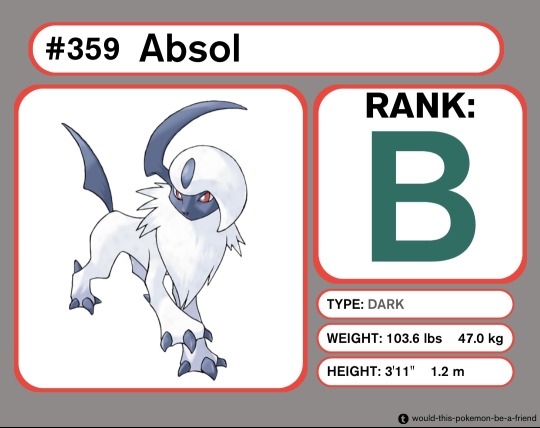
They may have a historically bad reputation, and some pretty intimidating claws, but at heart, absols are sweety-pies. They’re certainly shy, but they love helping people. An absol would make a great pet for a lot of owners, but not all.
The biggest issue with absols, it turns out, is their size. At almost four feet tall, they’re gonna be much too big for a lot of owners. Having spent time with some pretty big dogs in my life, I know that it can sometimes be difficult to make room for them, especially if they’re snuggly. Fans of bigger pets: an absol might be just right for you.
Tragically, absols have been treated with a lot of hostility and hatred by humans for many years (Platinum), and as a result they rarely show themselves to humans. Using the powerful horn on their heads, absols are capable of predicting natural disasters (Sapphire), and they, out of the kidneys of their hearts, constantly want to warn humans about them to protect them (Diamond/Pearl). In the past, this was misinterpreted as them causing natural disasters, earning them the moniker of “the disaster pokémon” (Ruby) and making them the target of violence (Platinum). When you consider all of this, it becomes clear that they would be excellent pets. If you were to win the trust and love of an absol, we know that they will care about you right back. They will want to protect you and everyone around by warning of disasters before they happen. Be warned, though: there’s still a lot of stigma surrounding absols. People of older generations still distrust and despise them, and may not understand you’re wanting to bring one into your home and neighborhood (Ultra Moon).
Perhaps surprisingly, given their reputation and appearance, absols aren’t exceptionally dangerous. Given their size and claws, moves like Night Slash raise an eyebrow, sure. Perish Song could make you faint, which anyone could tell you can be dangerous depending on the circumstances. Future Sight…well…it certainly looks painful. But, that all being said, absols are unlikely to use these moves on people. Even when faced with violence in the past, they chose to flee rather than fight. They have a calm disposition (Moon) and an affinity for humanity. Accidents still can happen, of course, so these moves still carry a penalty, but they’re less of a concern with absols than many dark-type pokémon.
While their size and abilities ensure that they would not be the best choice for every home, there are many cases in which an absol would make a great pet. As a final, interesting note: absols are said to have a lifespan of 100 years (Emerald)! This means that an absol will be a pet that you can bet on being around for a long time, and may even outlive you! Adopting an absol can be a big commitment, but it has a good chance of paying off in many years of loving companionship.
326 notes
·
View notes
Text
So I've finally read How Do We Relationship? by Tamifull
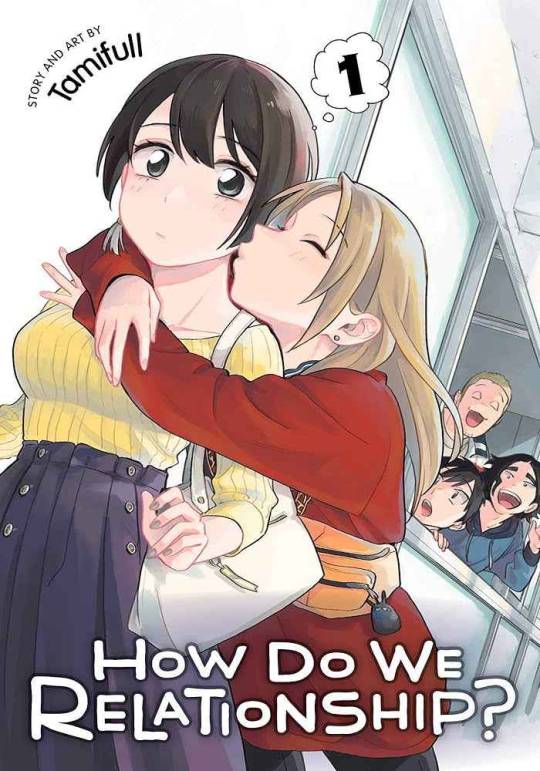
(spoilers for up to chapter 121 ahead)
What exactly is a relationship? Is it some natural part of the human experience where you pick a life partner? is it a social contract between individuals to ensure exclusive romantic and sexual feelings between each other? Is sex a requirement for a relationship? Is romance even?
I don't know to be honest. What I do know is this: How Do We Relationship? by Tamifull hit me like a truck and then backed up over the corpse.
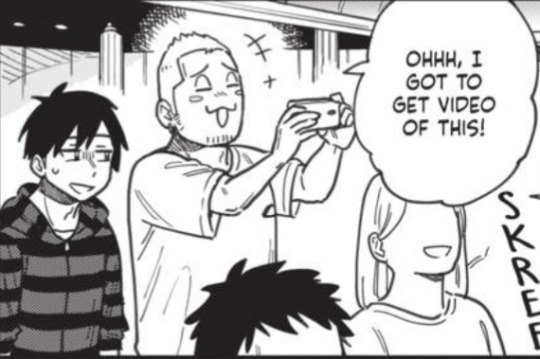
It might be one of the most nuanced, unflinching and uncompromising works about understanding relationships I've read. I think, in general, a lot of romance fiction feels overly wishful. While I can certainly appreciate a good gushy and feel good romance, it kinda gets tiresome seeing the same "will they, won't they (they will eventually)" and "love at first sight (it works out even though they literally have no chemistry)" stories regurgitated over and over again.
So much of it just feels too fake for me. Like I'm not watching two characters come to understand and fall for each other, I'm watching two halves of a couple who only exist to be a couple. Chemistry? Completely optional! Hardships? Temporary and will only make them love each other more afterwards. Break ups? Reserved exclusively as a failure state or for purely abusive relationships…
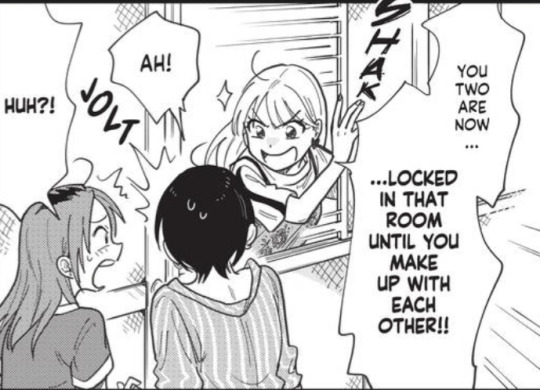
What sets How Do We Relationship? apart from its peers is its commitment to understanding its characters as people rather than archetypes. People who each have their own wants, fears, feelings towards sex and romance and most importantly: their own personal definition of what a relationship should be. People who when confronted with each other think they understand how everything should go, only to find out that the other person has a completely different understanding that doesn't fully jive with theirs.
The only yuri series I can think of that does something similar is Yuri is My Job! by Miman. Yuri is My Job! focuses heavily on the idea of fake relationships in Class S stories with it frequently asking "what actually makes something a relationship?"
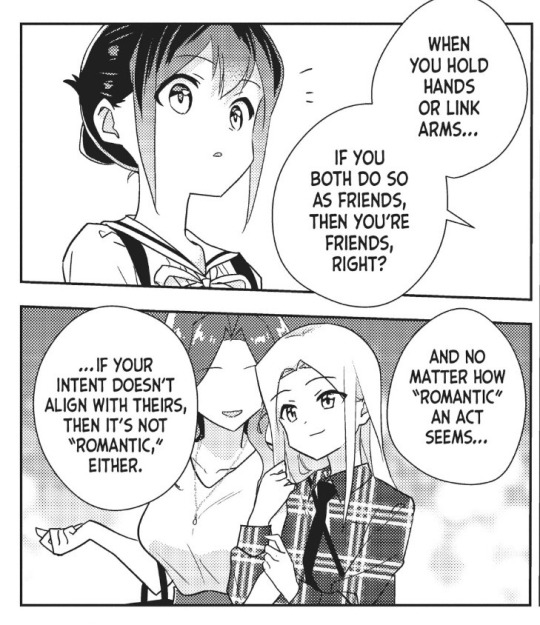
A lot of Yuri is My Job! is primarily a critique on Class S stories first (possibly also a direct refutation of Maria Watches Over Us… I still need to watch MariMite so I can't say for certain) with a lot of its characters being subversions of classic Class S archetypes. So a lot of its dissections of relationships are done in the context of Class S stories.
That being said, seeing a series directly refuting the idea of a relationship being static and instead coming to the conclusion that the only ones that can decide what a relationship is are the people involved? That stuck with me. How Do We Relationship? is far a more focused dissection of what it means to be in a relationship, or at least, what means for its particularly cast of characters.
Take, for instances, our two main characters: Miwa and Saeko

Miwa and Saeko start out as friends, but after coming out to each other and finding out they're both lesbians, they decide on a whim to date. At first glance, they seem like the perfect couple! After all, they bounce off of each other's personalities really well, enjoy each other's company (both out and about and in the bedroom) and in general seem to care for each other quite deeply. They were made for each other, right? Well, no.
They're both individuals with vastly different personalities, experiences and feelings from each other. Over time they begin to see things in their relationship that bother them. Mostly little things here and there. Nothing they want to start a fight over or strain their relationship over at first but… Small wounds still fester. It eventually finally comes to a head a little bit after Miwa visits her old crush in a high school reunion. It's very clear to both Saeko and Miwa that she hasn't actually gotten over her past feelings for her high school crush. What's more clear to Saeko is that Miwa doesn't feel the same level of love for her and she does for Miwa. Eventually they just… break up and go back to being friends.

In most romance stories, a break up is regularly seen as either the ultimate failure state for a relationship, a temporary set back for a relationship to overcome or purely as an escape valve from an abusive or just kind of shit relationship. The reality is that there many different reasons for a relationship to end.
Could Miwa and Saeko have worked it out? With the path they were heading down, no. Neither of them were willing to fully open up about their problems as both feared hurting the other. Which just ended up with them hurting each other even more. If they had continued the course, their break up might have been far more painful and resulted in them not being able to be friends any more.
And they do get to go back to being friends even after being exes!
I think back to my aunt who divorced her husband several decades ago. They ended their relationship but decided to remain close in part for their daughter's benefit. Over the years they've remained close friends and have gone back to living with each other as well. There's no hard rule that becoming exes means you have to fully cut each other off if that's not what you both want. Certainly there might still be mixed feelings between you both (Miwa and Saeko's relationship as friends certainly takes some huge bumps after they break up), but you shouldn't follow along with what society expects from you both in a relationship versus what you both want from YOUR relationship.
And that right there is Tamifull's thesis statement with How Do We Relationship?: don't determine how your life and relationships should be based on what society expects them to be.

Tamifull doesn't hold back anything when it comes to depicting how society treats relationships in general but also how it treats gay people in specific. While the physical danger of homophobia is always a constant that makes many queer people not want to be open with their queerness, being constantly other-ed in most social situations (whether intentionally or not) can frequently be reason enough to want to stay in the closet. Insensitive questions (that are more often born from ignorance rather than malice), being always seen as an outlier, frequently having to lie about who you like and a million other microaggressions that just build up as extra hardship in a queer relationships. Relationships are already not easy to keep together, but adding additional outside stressors can strain them even harder. Enter Shiho.
Shiho was Miwa's aforementioned high school crush whom she reconnected with during a high school reunion. After Miwa and Saeko's break up, Miwa started keeping up contact with her more and more and eventually has the opportunity to meet with her again. Miwa goes to meet with Shiho in order to confess her past feelings for her. Miwa is fully expecting to get turned down but when she meets Shiho, Shiho seems far more receptive and warm towards Miwa than she was expecting. Whatever mental protections Miwa had against the idea of actually having her feelings reciprocated crumbled as it seems like Shiho might have feelings for her as well? Could she actually get together with her old crush?

Unfortunately, while Shiho does have feelings for Miwa, she doesn't feel strong enough to deal with all the baggage that comes with being in a lesbian relationship with Miwa. She very clearly put a lot of thought into the subject, and while she does care for Miwa, she just can't put herself in a relationship with Miwa. Shiho isn't in the wrong about her own feelings and she doesn't invalidate Miwa's. But it still ends up breaking Miwa far more than if Shiho had out right rejected her.
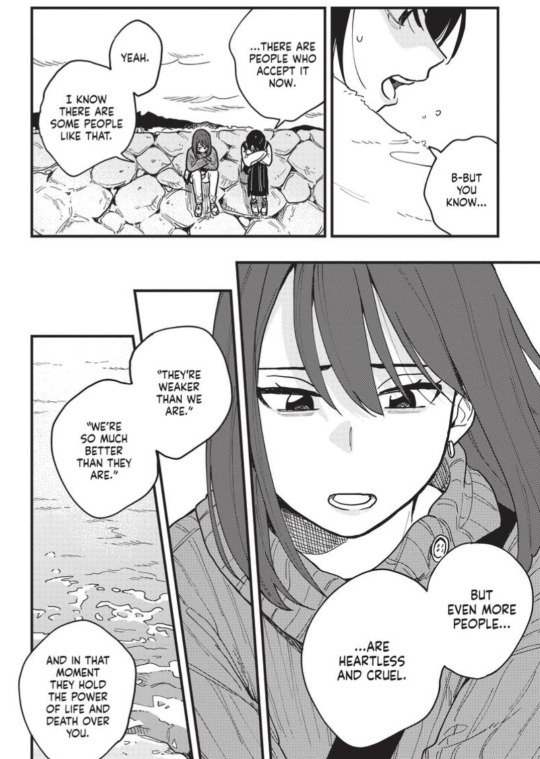
External factors can have a major effect on relationships but internal factors have arguably far more impact on relationships. Namely: sex and romance. Or more specifically: how everyone has different levels of interest in sex and romance.
Figuring out that I was ace and aro took way longer than it probably should have. "I have no interest in having sex with someone but I still get off to porn so clearly I can't be ace!" was legitimately a thought that stopped me from fully embracing being ace for several years. Eventually I figured out that sex-repulsion isn't a requirement of being ace and that the ace spectrum covers a pretty wide variety of experiences under it and that my own is just as valid as the others.
Over the years I've had to engrave a pretty simple idea into my soul: there is no universal experience when it comes to sex and love. Regardless of whether you're allo, ace or aro, you'll have very different feelings towards sexual and romantic interest than everyone else. Let's take, for example, Rika.

Rika is one of the supporting straight characters of the cast. She's also arguably the most sexually active member of the main cast with easily the highest body count of them all. And yet she does not want a relationship past friends-with-benefits. I'm not sure if she's necessarily aro or just not currently interested in a romantic relationship, but the point is that the main thing she wants from her relationships is sex. And that is completely fine! It sucks that when she explains this to dudes she just fucked who want to start dating her that she only wanted a sexual relationship with them and they respond by thinking she must have some family issues that make her so sexually active (she doesn't) or they respond derogatorily that she's just a slut. That's just part of who she is, there is nothing wrong with her. If she was a guy, it wouldn't even raise an eyebrow.
And then on the flip side, you have Tamaki.
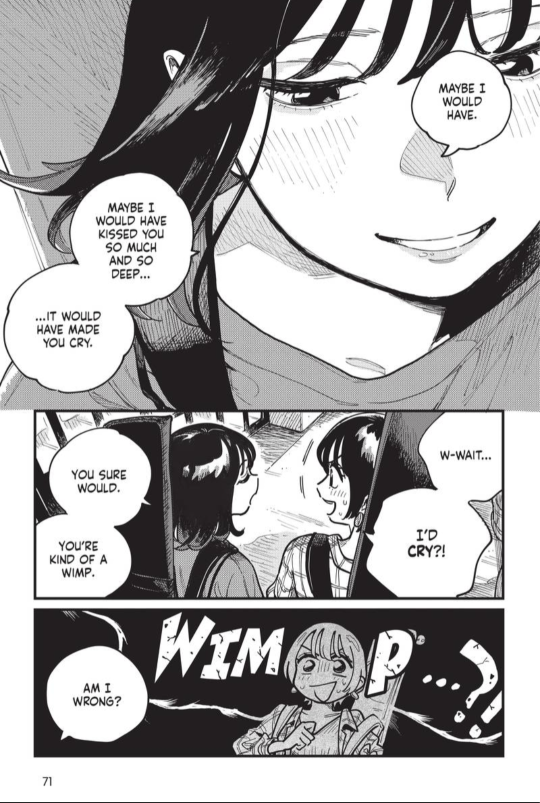
Some time after Miwa recovered from her heartbreak over Shiho (and after being sex friends with Saeko again for a bit), Miwa starts dating a year younger kouhai by the name of Tamaki. Tamaki is asexual/alloromantic, she very much has romantic feelings for Miwa and even enjoys kissing and looking at Miwa's body, but she has a very low sex drive. Miwa, on the other hand, has a pretty high sex drive. Tamaki and Miwa together might be one of the best depictions of an allosexual and asexual relationship I've ever seen.
I've know a number of aspecs who've gone through a similar situation as Miwa and Tamaki. Some are certainly able to come to an understanding with their allo partners about each other sexuality, personal boundaries and fulfilling each other's needs in a way that's healthy for both parties. But a lot end up in similar situations as Miwa and Tamaki.
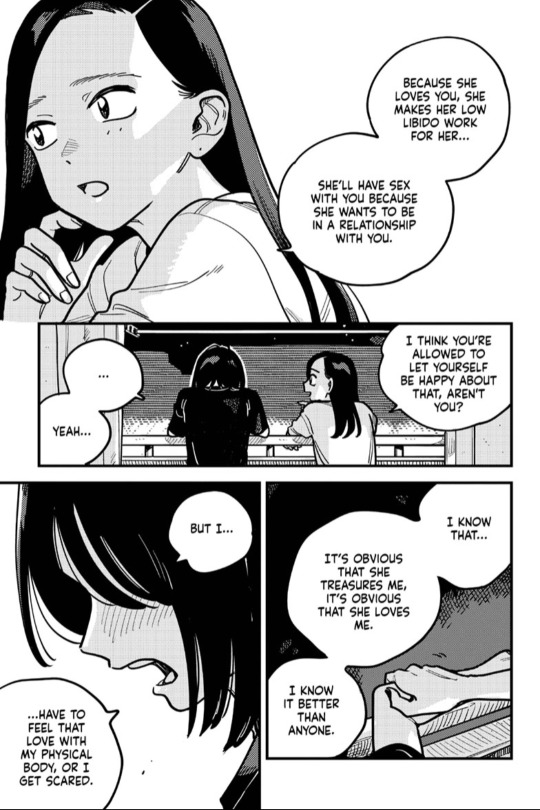
Where in one or both partners feel like they're hurting each other. Some aces feel guilt over not being able to provide for their partner's sexual needs, even if their allo partner assures that them feeling comfortable is far more important to them. Some allos might feel like they're raping their ace partners when they have sex, even if their ace partner expressly gives consent because they want satisfy their partner's needs, even if they themselves don't get anything out of the experience. If you get both together, you end up with a feedback loop of self hatred where the ace person sees their own lack sexual interest as actively harming the person they love and the allo person sees themselves as a monster for wanting to have sex with the person they love.
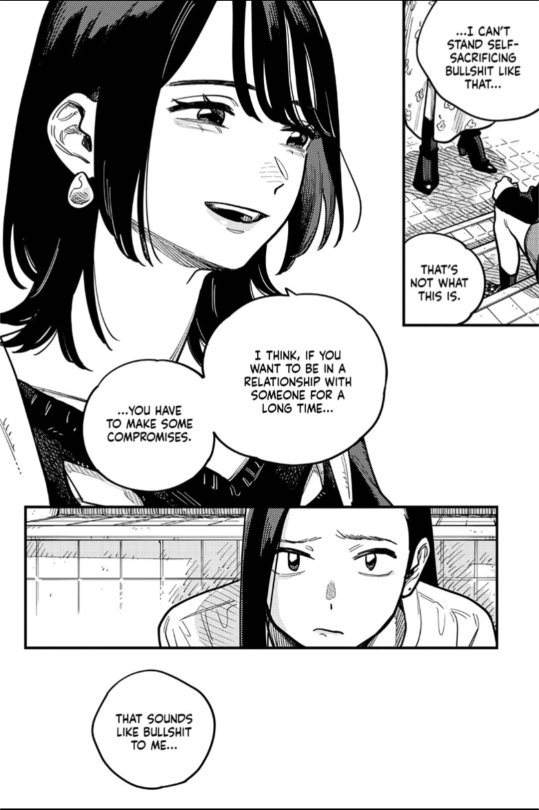
It's a toxic situation to be in, but it's also one that's hard to leave as both parties feel they themselves are in the wrong and their solutions to correct their error (the allo refraining from asking for sex and the ace more freely offering up sex) just lead to the situation escalating to the point of serious damage to one or both parties.
And unfortunately, that seems to have happened to Miwa. As of writing this, we're at chapter 121 so we're still early on the current arc, but it's looking like Miwa breaking up with Tamaki has done a number on her sex drive. I'm no expert on fluctuations in sexual interest due to trauma, so I won't dive too deeply into this (especially since we're still so early in the new arc). However, associating your sex drive as something that's actively harming your partner to the point that you leave them even though you still love them? Yeah, that's going to cause some damage.
I could ramble on and on about other aspects and topics that How Do We Relationship? does so well (Yuria/Saeko insecurities and dependencies, Saeko/Miwa's brief stint as friends-with-benefits, etc), but I've already said far, far more then I was originally already planning to say. So I think I might have save them for some future posts if I remember them.
So to finally end this now very long essay, I return to my original question: "what exactly is a relationship?"

I don't know, I ain't a cop. Whatever you and your partner(s) say it is, is what it is. But watch out though!
#how do we relationship#how do we relationship?#tsukiatte agetemo iikana#this was originally just suppose to be a quick little “hehe I read this and here are my thoughts” but then How Do We Relationship changed m#I didn't want to turn it into some kind of essay i swear!#the next person to place blame solely on tamaki for how their relationship ended is getting their head replaced with a rock#the next person to infantilize miwa instead of recognizing her as an actual person who makes her own decisions also gets a rock for a head#if you call saeko a red flag you also get a rock for a head#i've got plenty of rocks for everyone#unrelated but I was watching Noah Caldwell-Gervais' video on RAGE before writing this so I had his voice in my head narrating my script#it was surreal tbh...
71 notes
·
View notes
Note
The thing that really upsets me about the canyon is - look, they're always claiming their opponents are committing the sin of Character Hate, right? Character Hate is supposedly always bad faith and always wrong. But the only takes on Izzy that they'll accept as not qualifying as "hate" are ones that require incredibly bad faith uncharitable interpretations of other characters.
Season 1 left a lot of stuff about Izzy open to interpretation. But one thing was clear: what Izzy said to Ed in the "namby-pamby" scene was not just cruel in the usual way it's cruel to tell someone who's heartbroken to just man up because he'd be better off dead than acting like this (which would be bad enough honestly), it was the absolute most hurtful thing Ed Teach specifically could hear at that moment because it was stabbing him directly in the core trauma he'd carried for his entire life. Ed's absolute worst fear in the whole world is that the violence he's capable of, as exemplified by having killed his dad, proves he is a monster instead of an actual human person capable of love or friendship. So Izzy tells him he's just embarrassing himself trying to reach out to others, says his real self is a violent monster, then goads him till he does something violent and says see, this is the real you. That's insanely targeted. If you sat down and tried to think of the single most most incredibly harmful and triggering thing you could say or do to Ed you couldn't have done any better.
So that means the viewer has two options for how to interpret Izzy:
1) Izzy does not really know Ed very well at all when you get down to it, despite how long they've worked together. He doesn't get what Ed's trauma is all about or how it affects him and the fact that what he said is Ed's absolute deepest fear is just a coincidence. So he truly does not understand just how hurtful he's being and would never have said that stuff if he'd known.
or
2) Izzy does understand Ed pretty accurately and therefore he is being incredibly viciously cruel on purpose by deliberately reinforcing his most painful and unhealthy beliefs about himself, knowing how it's going to affect him.
Those are the only two possibilities! You could have an Izzy whose relationship with Ed was close enough to deeply understand him, or you could have an Izzy who actually cared about Ed and didn't want to hurt him. But you could not have both. The closer you assumed Ed and Izzy were, and the more actual trust and intimacy and understanding you thought existed between them, then the crueler you had to assume Izzy was being.
But the canyon didn't want to accept that! They want to insist that Ed and Izzy had a really close relationship involving trust and intimacy and understanding AND that Izzy cares deeply about Ed's well-being and only ever wants to act in his best interests. So they found a third option, which was to just throw out Ed's entire character arc.
If you refused to believe Ed's arc was what it very obviously was, then you could deny that Izzy was actually being all that hurtful. You just deny that Ed's arc is about fearing the exact things Izzy told him were true about himself. Instead they said...well, a lot of them just didn't seem to really care that they didn't have a clear sense of what Ed's arc was at all, but those who did seem to care about Ed settled on: Ed's problem is that he actually DOES have something deeply wrong with him that makes him uncontrollably violent and he's simply trying to run away from that, which is unhealthy, so Izzy is looking out for him by trying to force him to confront these hard truths, which he needs to do before he can grow. But unfortunately Ed completely overreacted to Izzy's harsh truth-telling.
Now I mean think about the narrative this implies. This means OFMD is a romcom centered around the idea that the indigenous lead's deep seated belief that he's an uncontrollably violent monster is ACTUALLY TRUE and the white man who tells him so is just trying to help him. That would be a narrative that was (a) incredibly mean-spirited, (b) intensely racist, and (c) made no sense at all as a love story centered on this character. Which is how you should be able to tell it's an absurd read! And it's supposed to be the people who say "no, Ed's arc is what it looks like, which means Izzy either isn't especially close to him or is emotionally abusing him on purpose" who are spreading character hate.
This is why we're always pointing out that you have to understand Ed is a lead character and Izzy is a supporting one. I know the canyon thinks that's some sort of pedantry but it matters here, because if an interpretation you like because of what it does for a supporting character's arc comes at the cost of making the lead character's arc totally nonsensical, that's a pretty basic way you can tell it's reading against the text!
So now we're post season 2. And season 2 not only unsurprisingly followed up on the character arc Ed actually did have in season 1, but it managed to go with the canyon worst case scenario of repeatedly reinforcing that Izzy really does not understand Ed very well in many ways AND ALSO AT THE SAME TIME specifying in his final scene that Izzy DID understand JUST enough to realize the whole time that he was being terrible to Ed and did it anyway on purpose for years. Super embarrassing for those guys. I guess the massive tantrums they threw about season 2 aren't really a surprise.
#406.
84 notes
·
View notes
Note
Hi, I love your page! What are your thoughts on Roy and Connor's relationship?
Hi! Thank you so much, I'm glad you like my posts :) and thank you sososo much for this ask, I love Roy and Connor's relationship and I'm glad I have an opportunity to talk about them. Sorry it's taken me all day to answer, but here you go :)
Short answer? That's his little brother.
Long answer?
I know that "fanon Batfam is canon Arrowfam" is tired and overused, but I really do think that, especially with Roy and Connor, there is some truth to it. While they haven't had too many interactions in canon, there's still a clear arc their relationship takes which I really like.
I don't like Chuck Dixon's Green Arrow run, obviously he's a shitty person but also his writing just isn't for me, but one of the few parts of it I did enjoy was Connor's first meeting with Roy in Green Arrow (1988) #97, prior to Ollie's death. It first establishes one of the most present themes in their relationship, which is the differences in relation to Ollie, and the contrasting experiences of being their father's sons. Roy's the son who grew up with Ollie, he knows him personally, the good and the bad, but his status as Ollie's son is still constantly in question, you can see it back in Longbow Hunters, Ollie calls Roy his son but still denies that that word has meaning ("Roy's a hell of a kid, but he's not mine. Not really.") Whereas Connor, there's never been any doubt that he's Ollie's son, he's his flesh and blood, but he never knew Ollie until he was already in adulthood. He knows Oliver Queen through magazines, but not personally. That's why when Ollie storms off after finding out he's Connor's dad Connor's shocked, but Roy isn't surprised when he hears that from Connor. He knows Ollie, and he knows how his fears of commitment would make him act. While this is only a minor theme of those specific issues where they first met, Roy helping Connor understand what it means to be Oliver Queen's son is one of my favourite parts of their later interaction.
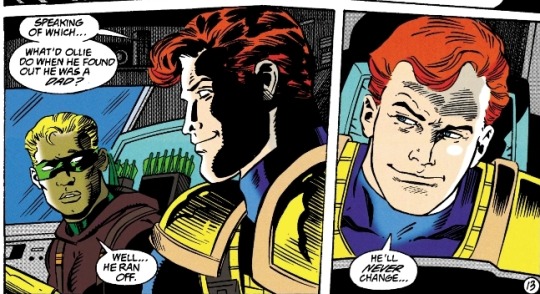
After Ollie's death, there is some tension between Roy and Connor, particularly around Connor joining the JLA in Ollie's place and becoming the new Green Arrow, first mentioned in Teen Titans (1996) #12-
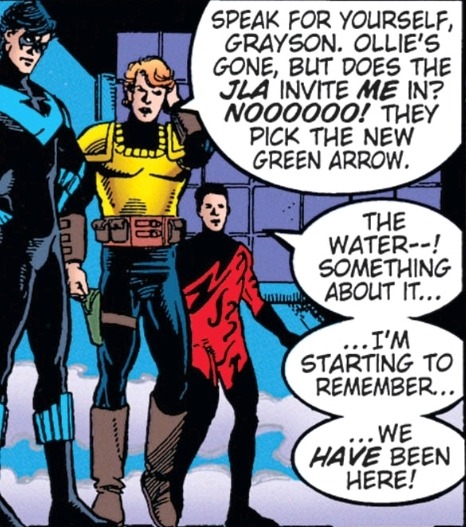
-which is later expanded on in Arsenal #2.
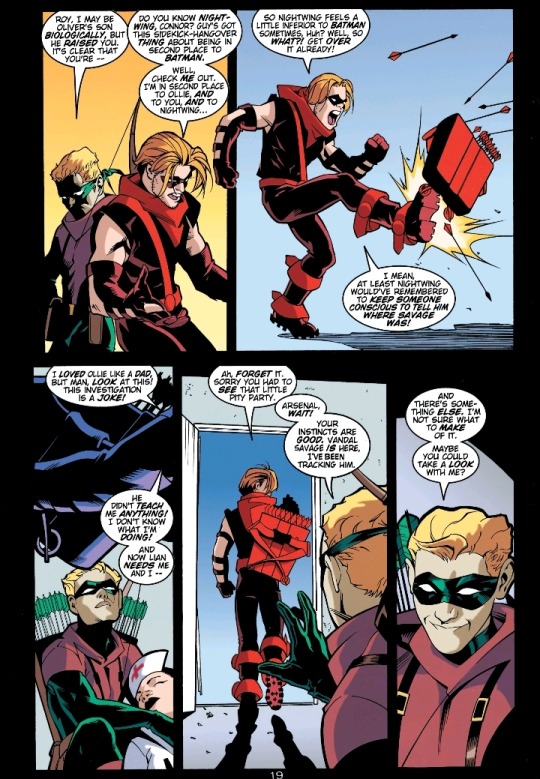
This is really the first time we see Roy and Connor have a heart to heart, and it shows Roy's inferiority complex. Due to tumblr photo limit I can't show more pages for this, but I think the one I chose is the most poignant because, at least in my eyes, it shows the insecurities both of them have in terms of their relation to Ollie, and how each of them address that. Roy's loud, he'll openly speak his mind and say what he feels, and that's why it's primarily about him (that and that it's his mini and Connor's a guest). Roy openly admits feeling inferior to Connor in his position as Ollie's son, even after Ollie's death. Connor, he's quieter about it, and gets spoken over by Roy before he can actually talk about his feelings (which is a pretty consistent problem Connor faces where people expect him to listen but not talk). But you can still see it in his body language, the shadow over his face looking downwards, and while he isn't allowed to finish his sentence you can still tell what he's about to say, that Roy's more of Ollie's son than he is. They both know that the other hasn't actually done anything, but they're not to blame for each feeling their own individual emotions.
They also address the topic of legacy in relation to Ollie in #3, and how there's this unspoken standard to live up to that neither of them ever really can. Roy's Ollie's mentee, his protege, he should be Ollie's legacy, and yet he's not Green Arrow, he's not in the JLA, and he's still coming in second place. Whereas Connor, he is Green Arrow, he's Ollie's legacy, he's in the JLA, but he's a better martial artist than archer.
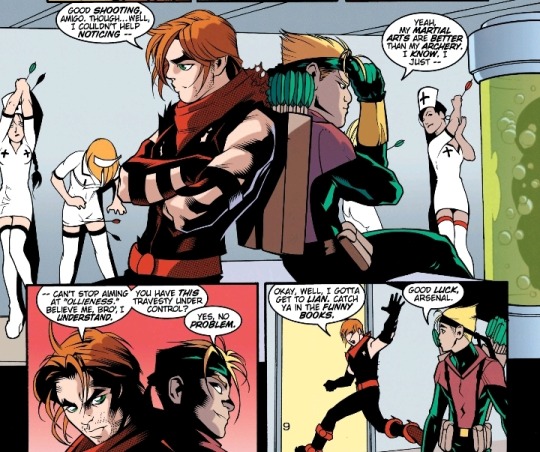
I wish they'd gotten more opportunities to interact while Ollie was dead because there was SO much potential for them during that period, but alas.
And now, I get to talk about one of my top five comics ever: Boys' Night Out, Green Arrow (2001) #32. Yeah, sure, the whole issue only happened because Ollie wanted Connor out of the house, but it's also the first comic to really explore the brotherly relationship between them, particularly in terms of Roy being older. Roy takes Connor bookshopping despite his own boredom-

-And then takes him to a strip club, where they have another heart to heart.
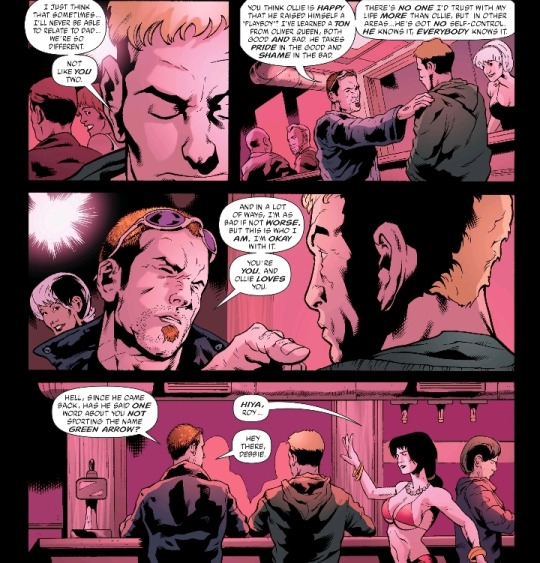
This page specifically is so important to me, because it's one of the few instances where Connor's actually being heard. Particularly in the 2000s but also in the 90s, a lot of Connor's character was defined by him being the voice of reason, the one who'll talk people down and listen to their problems, which ignores the fact that he's actually a pretty young guy, usually younger than the people he's helping (I suck with ages, I'm pretty sure he was 18 when he was first introduced which, by rough estimate using the Lian Method, would make him around 20-22 in the 2000s). I'm not saying that diminishes his emotional intelligence, he's clearly very emotionally intelligent, but it is a lot of pressure to put on someone that young to constantly be the one holding his family together. That's why I think this whole issue is so important for Connor, it's his chance to actually just be, and Roy's the best person for that. Despite what some fanon and canon characterisations suggest, Roy is absolutely not emotionally immature. Hell, you could make a pretty solid argument that part of the reason he took Connor to a strip club in the first place was to bring up the issue of Connor's sexuality. While asexuality wasn't as popularised as a term back then as it is today, the idea of Connor being queer was very present during Green Arrow (2001), albeit often used as a punchline, and while they're there Connor even gets referred to as a "friend of Madonna" by one of the workers. And while in Roy's head Connor was either gay or just had a low libido at that time, his "you're you and Ollie loves you" speech could very easily be interpreted as acceptance of his sexuality, even before Connor himself had figured it out. It acknowledges that, while Connor's good at helping other people work through their own problems, he's still a young person struggling with his identity, not understanding why he's so different to those around him, even his father. And Roy picks up on that, and tells him that it doesn't matter who or what he is, that what matters most is he's Connor, and him being Connor is enough to warrant love and support.
But Roy also doesn't treat Connor any differently to how he'd treat anyone else. When Connor says something Roy disagrees with, he calls him out

And I think Roy's treatment of Connor as an equal is very important. He doesn't depend on him or treat him like he's this pinnacle of wisdom, but he also doesn't coddle him and treat him like a baby. He calls his ass out, when he needs to! Roy's still a very loud and outspoken person, and he's not gonna change that because he and Connor had a heart to heart. I feel like a big problem with a lot of characters who enter into a family dynamic is that sometimes their writers change who they are at their core in order to have them fit into a specific role in the nuclear family, and while yeah, Roy's absolutely playing the role of an older brother in this issue, he's still Roy Harper, which I think is crucial. And conversely, Connor also calls Roy out when he does something he doesn't like!
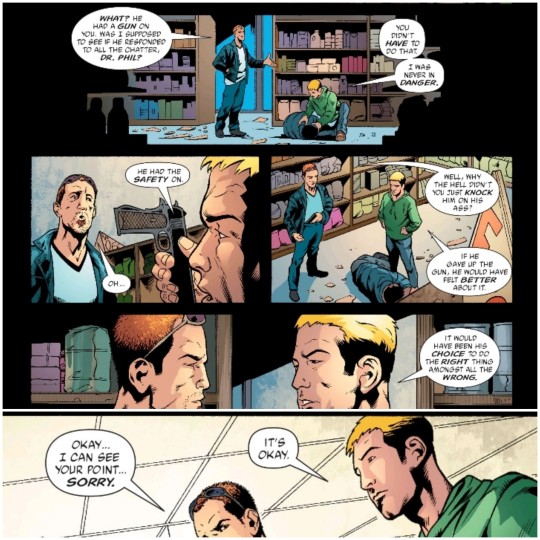
I'm running low on the photo limit so apologies for the quality of this collage, and I couldn't fit it in frame but for context Roy just knocked out a robber who Connor was trying to talk down. Connor explains to Roy his reasonings, and Roy apologises! I think this also highlights the differences in terms of their characters. They're both very protective of their families, but Roy tends to act first whereas Connor thinks things through. Roy saw Connor with a gun pointed at him and immediately took action, which contrasts Connor's reaction when Roy gets shot in Outsiders #6

Connor's more of a rational thinker in times of crisis, and he tends to try and think things through and avoid rash decisions, whereas Roy's very much an immediate responder if his family's at stake.
And then it ends with them actually acknowledging each other as brothers!
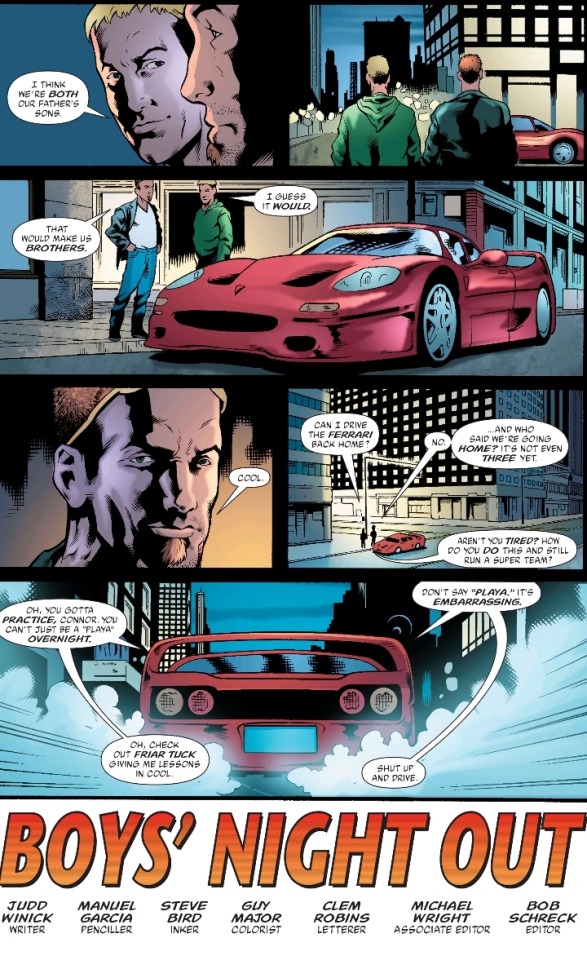
The ending of Boys' Night Out is so important to me, honestly, and it demonstrates one of the most important features of their relationship- trying to figure out what brotherhood means. There's not a big hug at the end, there doesn't need to be. Just an acknowledgement that they're in each others lives, that they're brothers, and it doesn't matter what that means. It's cool. I adore this issue so much, I had to make like half the post about it because it's so good and it's such a good example of why filler issues are needed. Sure, Williamson's run has it's sweet moments, but an issue like this where two characters just get to interact in a low stake scenario will always be so much more impactful than one hug in a big event.
So, yeah, I think my short answer sums it up pretty well. They're the brothers ever.
#sorry this took me all day to answer i had a lil bit too much to drink last night and had a hangover until like 5pm#pro tip don't have your first shot at midnight#roy harper#speedy#arsenal#red arrow#connor hawke#green arrow
61 notes
·
View notes